#Evangelion analysis
Text
sorry before I go to bed I’m thinking bout the different ways Evangelion portrays csa.
asuka's (metaphorical) rape is done by a stranger. someone she doesn’t know. a literal monster. as someone who’s always prided herself on being able to fight, being able to always win, this shatters asuka, who feels such a thing makes her weak. she responds to her trauma by regressing, playing video games at her friends house and speaking to her like a young child, before shutting down entirely to the point of attempted suicide. she’s later sexually abused by shinji, taking his own trauma out on her, and while we don’t see as much of how that effects her, we see the tragedy of the cycles of abuse play out.
shinji's sexual abuse is done by a friend. he doesn’t realise it’s wrong, and misato thinks she’s helping, because he’s a boy and boys like that right? but misato not realising the harm of her actions do not make her any less harmful. there’s a lot of complicated feelings and emotions there, and it very much deals heavily with the complexities of abuse- not all abusers realise what they’re doing. not all abusers even have sexual intent (misato absolutely doesn’t see shinji in a romantic light at all, she's not attracted to him). not all victims hate their abusers, and not all victims fully realise how inappropriate their abusers actions are. yet, the abuse still has impacts- as seen with shinji's complete lack of sexual boundaries, to the point of assaulting asuka for a desperate sense of control. he recognises that it’s awful- it’s something familiar to him to a degree- but as a severely traumatised child, he lashes out and inflicts his own pain on others. which is not acceptable, obviously, but it’s tragic, and shows how abuse makes people worse.
and as for rei, she's abused by her own father. the signs are there, but they don't entirely click at first, and neither do they click to the adults who should be looking out for her. the sexual abuse she faces is overlooked even when it’s right under everyone’s noses. and when someone does put the dots together, they blame her for it. rei's abuse, like a lot of familial abuse, is either ignored or something she’s considered at fault for, despite being sheltered and groomed all her life, and, y’know, fourteen. rei's arc also focuses heavily on her conflicted feelings about her abuser, but in a different way to shinji. she, at first, idolises gendo. she's been groomed her whole life, and is incredibly isolated. what happens is normal to her, she doesn’t see it as wrong because she’s never been told it’s wrong. the idea of not having faith in gendo is alien to her. but as time goes on, she realises what happens isn’t special, it isn’t okay. by the time she dies and another version of her takes her place (the rei's share a soul, so they’re the same person even if rei iii can’t remember everything) she’s quietly furious at the idea of being a doll, and realises she can be more. when her abuser touches her, she literally tears off his hand. and she attains agency! that’s the final part of her storyline. she has agency, for the first time in her life. and she might have chose to listen to shinji on what to do, but she chose for the first time, it’s a massive step and honestly it really struck me as a beautiful ending to her character arc.
idk man. i just like how this mecha anime interrogates a sensitive subject from multiple angles and has genuinely suprisingly good depictions of even abuse that’s not recognised as abuse by most still. it’s nice! it’s refreshing. honestly, they committed to exploring abuse and never trying to apologise for it, and it’s fucking great. i'm personally not a csa victim, but i did go through sexual trauma at around the same ages of these characters, and i found myself relating a lot to their arcs around this due to that even if our experiences are pretty different. i felt aspects of how i dealt with things, especially in rei and shinji but to a degree asuka as well, and it made me feel more confident in myself. if shinji ikari can choose to live, so can I :)
#neon genesis evangelion#evangelion analysis#asuka Langley soryu#shinji ikari#rei ayanami#csa tw#rape tw#grooming tw#abuse tw#suicide tw#cocsa tw
64 notes
·
View notes
Text
Revolutionary Girl Utena and Neon Genesis Evangelion: Parallels Between Characters and Their Relationships
PREFACE: I wrote this a few years ago and never published it; I was around 15 and I don't think everything I said was entirely accurate, however I do feel like I made connections between these two shows that I haven't seen many talk about, so I'm gonna post it. If anything I say is off, feel free to correct me!
Anyway:
Something I've realized while rewatching Neon Genesis Evangelion is how similar Rei and Gendo's dynamic is to Akio and Anthy's in Revolutionary Girl Utena. Here are some characters and dynamics that I thought were similar, most of them revolving around the characters' connections to Anthy or Rei:
Asuka and Nanami as Antagonists
Anthy and Rei both have very quiet personalities. Both are stoic and appear off-putting to others around them. The characters Asuka and Nanami similarly hold disdain for Rei/Anthy and berate them for being weird.
Nanami harbors jealousy towards Anthy after seeing her in a relationship with her brother. Even though she resents her, the two are both in similar incestuous relationships. Anthy's situation could be a reflection of what could happen to Nanami if she took her relationship with Toga too far. But luckily Nanami realizes that she never really had feelings for her brother, and that she just wanted his validation. But before Nanami realizes all that, she acts as an antagonist to Anthy. She's constantly bullying her, and calling her out for her "weird" behavior. Asuka is similar with Rei. She's not necessarily jealous of Rei but she does project her insecurities on Rei, just look at the elevator scene. She calls Rei a doll for being subservient to Gendo, but she herself is afraid of becoming one. Nanami and Asuka, on the surface, couldn't be any more different than Anthy and Rei, but in reality Anthy and Rei represent a lot of the Nanami and Asuka's insecurities, or reflect the situations they're in.
Gendo and Akio, Both Abusers
Anthy and Rei are both extremely loyal to Akio and Gendo. Throughout each series, they are used to attain Akio/Gendo's goals, with Gendo's being to reunite with Yui and Akio's to maintain power over everyone in Ohtori. Because of how reliant Gendo and Akio's plans are on Rei/Anthy, they both get to know a lot about what's going on behind the scenes in the story, where other characters may not.
Akio and Gendo are very similar to each other, too.
Akio is able to manipulate people using sex. He even sexually assaults Anthy. Anthy endures Akio's abuse for so long that she's scared of leaving him; what if she escapes and finds that the world outside Ohtori is even more cruel?
Like Akio, Gendo also uses sex to control the women around him. He takes advantage of both Akagi and Ritsuko, disposing of them when he no longer needs them, just like Rei fears he will do to her when her use runs out.
Rei exists to obey Gendo. She's a clone, made to serve his desires. Rei wants to leave Gendo, she wants to die but he needs her to achieve Human Instrumentality. All she knows is to be obedient to Gendo, so she continues to follow his orders without considering her own feelings.
Anthy and Rei are cursed to serve Akio and Gendo, and though both dislike their situations, they see no hope of escaping. Not until Utena and Shinji step into their lives.
Utena and Shinji, the Protagonists
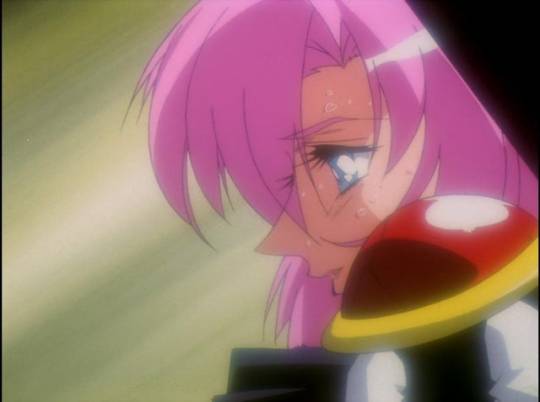
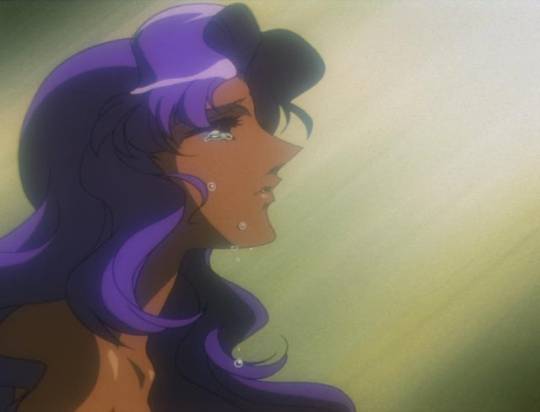
Utena spends the whole series selfishly playing the role of the prince, but once she begins to understand Anthy's situation, she is able to give up princehood and inspire Anthy to leave Akio. Utena doesn't save Anthy, but she gives her the courage to leave her situation, to decide for herself that she wants to leave.
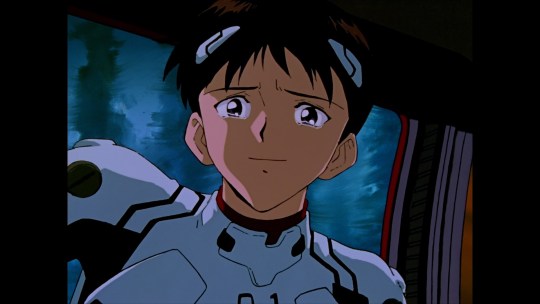

Shinji shows interest in Rei's feelings. He encourages her to express herself, and tells her to smile. While Gendo sees Rei as a disposable clone, Shinji cares about her in a way Gendo never did. He wants her to be happy. While Shinji's motives are still selfish (with Shinji failing to understand Rei, just as Utena still treats Anthy as an object in her attempt to "save her" through the duels), he still shows more concern for her than she's ever experienced from anyone else.
[The scene where Shinji tells Rei to smile visually reminds me of RGU's finale. Shinji looks down on Rei, just as Utena does Anthy. Shinji tries to pull Rei out of the entry plug (the duty she's bound to— being a pilot, being Gendo's servant), as Utena tries to pull Anthy out of her coffin (trapped with Akio, the revolving system of capitalism and patriarchy, as well as literally being stuck in the cycle of abuse).]
Rei chooses to sacrifice herself, and after her death is replaced by her clone Rei 3. Rei 3 carries Rei 2's emotions but doesn't understand them at first. In the End of Evangelion, when Gendo tries to use Rei to start the Third Impact, she rejects him and chooses to start the Third Impact on her own will. (Possibly because of Shinji's influence).
Gendo and Akio Again
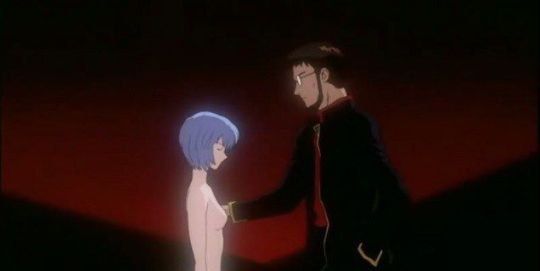
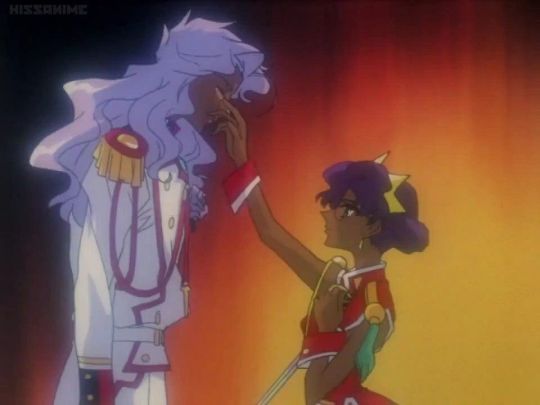
I think the similarities in these scenes are interesting.
Gendo stands over Rei as Akio stands over Anthy— each man exerting power over these girls. Gendo reaches down to grope Rei, trying to control her, and Anthy reaches up towards Akio to comfort him; Akio is using his emotions to manipulate and maintain his control over Anthy.
The lighting in these shots is similar. I don't know how either Anno or Ikuhara meant for the colors used in these scenes to be interpreted. I can only give my interpretation. Red is predominant, especially in the shot from Evangelion. A color that can represent passion. Perhaps this is Gendo's passion for power, for Yui, for eternity? Love and romance are often represented by red, and that includes lust. The red background could show Gendo's lust for Yui— literally in the sense that he's attracted to her as her partner— but most importantly, in the sense that he lusts after her, he desires to return to her. This lust extends to Rei, Gendo's recreation of Yui as well as a vehicle to which he can use to reunite with Yui. [Note: it's implied that Gendo sexually abused Rei, which isn't surprising considering she's a clone of Yui and the way he uses sex to control and manipulate. In the scene pictured above, he gropes Rei's breast— this is right before Rei rejects Gendo and takes the form of Lilith.]
Not only does red represent lust, but also power. It's a bold color, dominating both of these shots. It contributes to the sense of control Gendo and Akio have over Rei and Anthy. Red is used in this context often in Utena. The character Touga manipulates the girls around him in a similar fashion as Akio and Gendo (while also being manipulated by Akio). He manipulates Utena and his sister Nanami, taking advantage of their affection for him (both girls later realizing they never felt for Touga romantically). And Touga's red hair color, like other characters in Utena, signifies this power he holds.
In the RGU shot, red mainly covers Akio. Yellow is also prominent, centering around Anthy. Yellow is most often associated with Nanami in Utena, who represents jealousy— as I mentioned earlier, in her relationship with Anthy—, as well as Nanami's innocence, and perhaps ignorance.
Akio holds control over his Anthy, his victim. Her innocence is highlighted in this scene— she's not ignorant to what's going on, nor is she innocent in that sense. She's informed of and contributes to Akio's system. However, she finds herself trapped in this system, making her Akio's victim. In this sense the innocence in her attempt to comfort him contrasts his desire for power. He knows what he's doing. He cries fake tears. In the climax of RGU, Akio weaponizes his emotions in an attempt to get Anthy to stay. The colors emphasize Akio's power and Anthy's lack of agency in comparison.
Akio is trying to maintain his power over Anthy through these false tears.
Conclusion
Ultimately Gendo and Akio fail to maintain their control. Anthy breaks out of Akio's system, and Rei becomes Lilith on her own accord. It doesn't completely end their goals. Akio's system is still maintained for the rest who chose not to leave, and Gendo is able to reunite with Yui during the Third Impact— even if it is a false perception of her. But their initial plans fall apart, and the characters they've been attempting to manipulate are eventually able to escape. This doesn't just apply to Rei and Anthy, but also the other protagonists— the pilots whom Nerv abuses for their goals, and Utena and any of the other characters who find the courage to leave Ohtori. Evangelion focuses on Shinji's monologue primarily, but the show's message inspires the audience, and by extension the other characters, to live a fulfilling life despite everything. Utena and Anthy both escape Ohtori, but the possibility is there for any of the other characters that question Ohtori (a larger representation of abuse, capitalism, patriarchy, and systems that bind us) to escape as well. Ultimately these characters, these people, these systems don't have as much control as they project onto others. They influence so many aspects of life, but it's not impossible to defy them.
Ok, I've just been incoherently rambling so maybe this post has no point, but hopefully it makes SOME sense. Maybe, maybe you can see what I mean by all of (or at least any of) this. Sorry if this makes zero sense and means nothing. That is, if anyone does see this. But hopefully some enjoy my ramblings
#revolutionary girl utena#neon genesis evangelion#analysis#evangelion analysis#revolutionary girl utena analysis#utena#rgu#evangelion#anthy himemiya#akio ohtori#gendo ikari#rei ayanami#tw: csa#tw: inc*st#tw: abuse
40 notes
·
View notes
Text
Asuka Langley Sohryu analysis
VERY LONG POST!!!!!!!
This essay is purely for my own autistic ass, make of it what you will lol.
Asuka is often viewed as a conceited, narcissistic and deeply flawed character in NGE. I don’t believe Soryu is truly as horrendous as others perceive her to be, perhaps that is due to my own projections or simply me giving her the benefit of the doubt, so I’ve decided to take it upon myself to truly understand every aspect of her traumas, her actions throughout the series and finally her death. I want to know what caused her to become such a self loathing yet egotistical child. every tiny detail of her personality can be traced back to specific events, she's been created with such detail and precision, it's hard not to want to delve deeper into her story.
Prior to the traumatic events of NGE Asuka had a horrific home life. She was neglected by her mother who was busy with work, leaving Asuka feeling irrelevant. This sparked an overwhelming need for attention, which followed her from early childhood right until her last breath.
Kyoko Sohryu (Asuka’s mother) was a key scientist in the German division of Gehirn. (What would later become NERV’s third branch.) She was the subject of the contact experiment with Unit-02, where during this experiment part of Koyokos soul would bond with the eva, causing severe mental damage. This led to her becoming incredibly unstable and psychotic, believing one of Asuka’s dolls was her daughter rather than Asuka. As a result of her mothers insanity, Asuka felt even more neglected and abandoned. She was replaced by a doll, not even a human, but an inanimate object.
At Kyoko’s most deranged she pleaded Asuka to die with her in a double suicide, to which Asuka, in an act of desperation to be loved, agreed. Her mother instead hung herself alongside the doll. Asuka was so replaceable to her own mother that she wasn't even worth being killed. In later life Asuka grows to feel utter contempt and disgust towards her own weakness; she was completely vulnerable and desperate to be loved, so much so that she would have died. She’s extremely black or white. If he can’t be loved, she should die.
The Asuka we are first introduced to doesn't seem to carry much of this weight at all. She’s bright, bubbly, feisty and fun. Her presence brings a much needed lift to the show with dance routines, montages and general playfulness from both her and Shinji. How can such a broken character appear so confident? Asuka uses her ego as a safety net, she wants to appear as confident (if not bordering on narcissistic) as possible to hide the fact that she is very much still an insecure child. If she doesn't appear vulnerable, no one can hurt her. Her confidence will project onto those around her and she will be the most loved girl in Japan, right? She is the best Eva pilot by far, they need her. These thoughts are enough to keep her not only alive, but living.
Obviously this doesn't keep up, as we see Shinji strike Asuka’s nerves more and more with every episode that passes. Shinji is the counterpart to Asuka, everything that he lacks, she will overcompensate with. His nonchalant, pessimistic, self pitying attitude is everything she hates. But shinji isn't all too dissimilar from Asuka at all, his ego is absolutely huge; if he isn’t happy, why should anyone else be, he's not loved so everyone should die. Everything that Asuka pushes onto herself, Shinji pushes onto others. This causes a very expected clash between the two. Part of me believes that Asuka potentially sees in Shinji what she could have become if she had not been chosen to pilot unit-02. Someone merely existing, an insecure child whining at any given chance about doing this, that and the next thing. Someone ‘useless’. Asuka demands to be used at any given chance for recognition and validation, even at the prospective cost of her life/sanity.
While Shinji is the embodiment of the internal threat of her deep rooted shame, insecurities and fears, Rei represents the external threat that she can and will be replaced. Rei is the golden child, she does as she’s told, she fights well. This can be proven in episode 22 after Asuka has yet again been defeated by an angel, her sync rates drop. This comes as a massive blow to her fragile ego. To make it worse, Ritsko notices Asukas mental disturbance and orders Rei to shoot the Angel, leaving Asuka literally in her shadow. This is when the mindrape (i hate that term but i can't think of anything better to describe it as) occurs, leaving Ritsuko no choice but to start looking for a replacement pilot. Rei ends up saving her by using the spear of longinus. This absolutely destroys Asuka, how could she be shadowed, let alone saved by someone as spineless as Rei? She's being replaced yet again, bringing her back to square one in regards to her Mothers horrific passing. At this point both Shinji and Rei are performing better than her, proving her to be useless. The very thing she berated Shinji for from the beginning.
Kaji and Misato also play some of the most important roles in Asukas life, being her only acting guardians. Kaji is the only person we see Asuka actively regress back into a childlike state with. Her pleas to be recognised and loved by him are overwhelmingly upsetting. Screaming that she is an adult, that she wants to have intercourse by him and be viewed as somewhat of an object is a desperate cry for help. She wants to prove that she’s no longer an insecure child, but her ways of doing so only prove that more. While Kaji never made advances on her, he equally enabled it to an extent. I believe that sex is what Asuka perceives as the most adult thing she can comprehend, so she yearns for it with an adult figure to not only prove to him but herself that she is no longer the sobbing infant at her mother’s dangling feet. Kaji seems somewhat aware of her past, which may be why he never put his foot down with her. He knows that the harsh rejection of her advances would cause the spiral that eventually came due to her sync scores dropping. Pleading for intimacy may also be (in her mind) one of the least shameful ways for Asuka to beg for validation. We never saw Asuka in this state with any of her classmates, leading me to believe that she uses Kaji as he is somewhat of a parental figure to her, as fucked up as that is. She needs him to validate and praise her as she never got that from either of her parents, but would never hurt her pride by saying that blatantly therefore relying on sex to get her point across. When it’s revealed that Misato had previous relations with Kaji, this obviously hurts Asuka’s ego to an extent. She views Misato as a fully fledged woman who, like Rei, is capable of what she is not. Asuka’s battle with the constant sexualisation of herself is one of the most misunderstood parts of her character. A lot of people seem to believe it was used as fucked up fanservice, but i wholeheartedly think it’s a very jarringly real way to portray how neglect and abuse can affect a young girl, regardless of how uncomfortable it is to watch firsthand. It rounds out her backstory fully and adds a whole other level of depth to her character for individuals to identify with.
At the end of Evangelion we have a broken, soulless and decayed Asuka. She is no longer the abrasive, confident and overbearing character some of us (guiltily) adored. Only a miracle could bring back the determined character we know and love. Thrown into unit-02 for safety, Soryu is left comatosed only for her mothers voice to wake her. Kyoko can be heard saying the words ‘You’re alive!’ several times. This implies that the maternal part of Kyoko's soul was the one trapped inside unit-02, and is now cheering Asuka to fight, to live! However, another voice joins in, begging Asuka to ‘Please die with me!’. Both these voices mix together, thus suggesting that the insane Kyoko and Maternal Kyoko have merged together inside the Eva. Regardless of her mother chanting to die with her, the voice telling her to live on shines through and provides the motivation to have one of (what I consider) one of the best battles in cinematic history. Asuka comes to the realization that she was never truly alone. Her mother was always watching over her, watching her pilot the eva. Everything she had ever longed for was truly validated in that moment. She fought with a might that we had never seen before, she truly gave it her all. It feels so incredibly bittersweet to see her truly at her happiest, screaming out ‘mama!’ as she brutally tears mass unit eva’s to shreds, smashing their heads in, ripping off limbs etc. The whole scene is so authentically Asuka Langley Sohryu. The sheer shock, the horrifying events unfolding while she has a wide grin on her face. She was actively risking her life knowing she has the validation she has craved since he was a toddler. Everything I have spoken about in this essay truly comes together in this heart wrenching scene; her screaming about useless shinji, her crying out for her ‘mama’, her overbearing confidence in herself. Even in her last moments she was determined, not to prove to anyone else but herself that she was useful. She says through gritted teeth and a struggling breath ‘I’ll kill you’ thus proving how she was genuinely set on being seen till her very last moments on earth.
I firmly believe that Asuka is one of the most well thought out and genuinely complete characters I’ve ever seen in fiction. While she is not the most ‘likeble’ she provides a very important role in making Neon Genesis Evangelion the show we know and love. Anno has done a fantastic job of creating a character that is so easy to hate yet so easy to relate to. As previously mentioned, some of this may be projection but I truly do feel she is a character anyone could pick apart and find some sort of self in.
#long reads#long post#evangelion#eva#neon genesis evangelion#evangelion analysis#evangelion essay#asuka langley#asuka
25 notes
·
View notes
Text
Okay, after watching End of Evangelion in theaters this past Sunday, I decided to do an analysis of the live action sequence in the film.
This sequence can perhaps be considered the weirdest part of the movie, as it doesn't truly fit in the plot, unlike the other weird parts.
So a quick rundown.
Taking a break from being in the sea of lcl where everyone is a singular being. We cut to live action of a man opening his eyes, taking in an empty movie theater.

Followed by a sequence of everyday clips.
Then we see people watching the early screening of Evangelion death & rebirth in theaters.

Followed by the voice actors who played Asuka, Rei, and Misato

Followed by three mannequins dressed up as Asuka, Rei, and Misato

Followed once more by people watching Evangelion Death & Rebirth, followed once more by an empty theater, then some fanmail to the Gainax team, and then we return to the regularly scheduled program that is human instrumentality.
Let us now take a look at the dialogue.
Shinji (voice): Hey…
Misato (voice): What?
Shinji (voice): What are dreams?
Misato (voice): Dreams?
Rei: Yes, dreams.
(Screen text: Do you feel good?)
Shinji (voice): I don’t understand… I don’t really understand reality.
Rei (voice): So, you can’t understand the gap between other’s reality and your own truth.
Shinji (voice): I don’t know where to find happiness.
Rei (voice): So, you can only find happiness in your dreams.
Shinji (voice): Then, this isn’t reality… Because no one is here.
Rei (voice): Yes, it’s a dream.
Shinji (voice): So, I’m not here either.
Rei (voice): You were trying to remake reality with convenient fantasies.
Shinji (voice): Is that wrong?
Rei (voice): You were using fabrications to escape from reality.
Shinji (voice): Can’t I dream alone?
Rei (voice): That would not be a dream. It would just be compensating for reality.
Shinji (voice): Then… where is my dream?
Rei (voice): It is the continuation of reality.
Shinji (voice): Where is… my reality?
Rei (voice): It is at the end of your dream.
The dialogue seems to imply that the live action real world is Shinji's dream, a world where he doesn't exist. The truth is though, that it forces the viewer to confront the fact that Evangelion isn't real. It's a dream.
Now Anno has stated that Evangelion a consideration of Otaku, specifically the aspect of escapism, hence Shinji's common line in Evangelion, "I mustn't run away." While in Shinji's case it is meant as not running away from responsibility, in human instrumentality it also comes to mean not running away from the harsh pain of reality.
In order to further analyze this point, one must consider Anno's relationship with the fanbase. In an interview he has stated
For the TV series, we certainly ran out of time. We had no time for episode 25, so we remade it for the theatrical edition. The final episode, episode 26, was going to be that way originally.
Episode 26 was always meant to be the positive ending it was in the show, but because of the fan response, he was made to redo it to something darker and more gritty.
Another fact is that there was a live action scene cut from the film. In it we see the voice actors of Misato, Rei, Asuka, and Toji, playing their characters, living out their lives in a world where Shinji doesn't exist. Throughout this scene, we hear Shinji, voiced by Hideaki Anno this time, calling out to the characters, but they can't hear him. In the end, he remarks, "I'm not here." Anno is recognizing his own attempts at escapism through his work, and admitting that he too is an otaku, he is trying to convey to the audience that he is not attacking them, but trying to help them, as well as himself, with the problem of escapism.
The live action is therefore inserted not as a revenge against the fans, but statement to them, about learning to live in reality, while still enjoying the fantasy and dreams of such fiction.
#neon genesis evangelion#evangelion#end of evangelion#hideaki anno#ikari shinji#shinji ikari#asuka langely#asuka langley soryu#misato katsuragi#misato#rei ayamani#ayanami rei#evangelion analysis#analysis
6 notes
·
View notes
Text
Barbie and neon genesis evangelion
Why do the Barbie movie and evangelion give me the same existential dread?
probably because both made me reflect on what the human condition really means or more specifically what does it mean to be human.
Barbie and rei both are technically not human, Barbie of course being a doll and rei being just one of many. But although both start off quote unquote “perfect” (rei not feeling emotions and Barbie just being happy) they grow to feel. Barbie cries and rei begins to feel, both causing those around them to panic. Asuka confronting rei in the elevator scene and all of the other Barbie’s screaming about flat feet both exemplify this sort of human growth, they aren’t just what they were made for anymore.
And to me, I think that’s what being human is…growing to be more than what you were made for. We all start off as extensions of our parents, our upbringings, our environment. But then we grow up.
We make friends, form our own opinions, and choose for ourselves the environment in which we settle. But we can always grow, that’s what is special about humanity.
to me? That’s the very thing that makes us human.
#barbie#neon genesis evangelion#character analysis#barbie movie#barbie spoilers#barbie analysis#margot robbie#rei ayanami#rei evangelion#evangelion analysis#Neon genesis evangelion analysis#humanity#the human condition
12 notes
·
View notes
Text
What My Father Wanted was to Kill God: Reflecting on the cycle of Rebuild of Evangelion

It's been two years now, since Evangelion 3.0+1.0 hit Japanese cinemas for the first time.
I think many of us chose to say goodbye to Eva on that day, too, leaving satisfied. I can't fault anyone for this. But there's a part of me that stings knowing that 3.0+1.0 has been left relatively un-combed-through in comparison to the other films, and I don't feel right leaving it this way.
Today, I want to dissect "loop theory" - what it was before 3.0+1.0 came out, in what ways we missed the mark back then, and finally, what the resolution of 3.0+1.0 meant for the story.
I want to understand what it meant to kill God.
This article was heavily inspired by "What was loop theory? Investigating the truth after Evangelion 3.0+1.0", by Japanese fan-channel Eva Fan.
If you want to understand the meta angle of Rebuild better (i.e. "why does Rebuild even exist in the first place?"), please watch the NHK Professional documentary on Anno and the production of 3.0+1.0 (not "The Final Challenge of Evangelion" version on Amazon, although you should watch this one too because they're both great.) The meta of Rebuild is outside the scope of this article.
SECTION 1: WHAT WAS LOOP THEORY?
If you're already familiar with the basis of loop theory, you can probably skip this section and head to section 2. This is gonna be a lot of recap.
I, for one, have never been a huge fan of the idea of "loop theory". This isn't to say that I've ever disagreed with the conclusion that Rebuild's world is stuck in a loop, more that I felt like painting it as a "theory" is seeding more ground to bad faith actors in the fandom than necessary.
However, I'm using the term here to refer generally to different theories about the loops, namely those regarding Kaworu and potential connections with End of Eva.
Now that all of the disclaimers are out of the way...
ESTABLISHING OUR BASES, PART 1: THE MESSENGER
From the moment he's introduced, Kaworu's entire purpose in the first two films seems to be establishing the loop to the audience.
His familiarity with previous versions of Shinji is front and centre in the very first line he speaks.
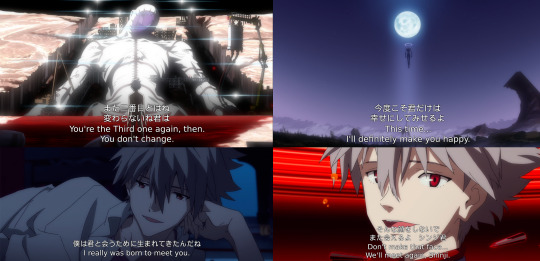
Some relevant lines from Kaworu in 1.0, 2.0 and 3.0. Full sized image here.
While at this stage, we lack information on how much Kaworu knows, we are at least aware of his knowledge of previous iterations of the Eva world in that first line there: "The Third one again".
This is compounded at the very end of 2.0, in which he declares that "this time" (as opposed to previous times, presumably failed attempts), he will make Shinji happy.
In 3.0, there's a moment in which he seems to confirm to himself his musing in NGE of having been "born to meet" Shinji (notice the lack of のかもしれない "probably"), and following some more ambiguous lines we'll skip over, at the end of a long speech about parts of ourselves remaining in the world even after we're gone, he suggests he and Shinji will see each other again just before he dies.
These lines lead some fans to believe that the loops were in some way or another, under Kaworu's control. This iteration of loop theory suggested that the loops exist so that Kaworu, who remembers the events of NGE, can achieve his goal of "making Shinji happy".
ESTABLISHING OUR BASES, PART 2: THE RED SEA
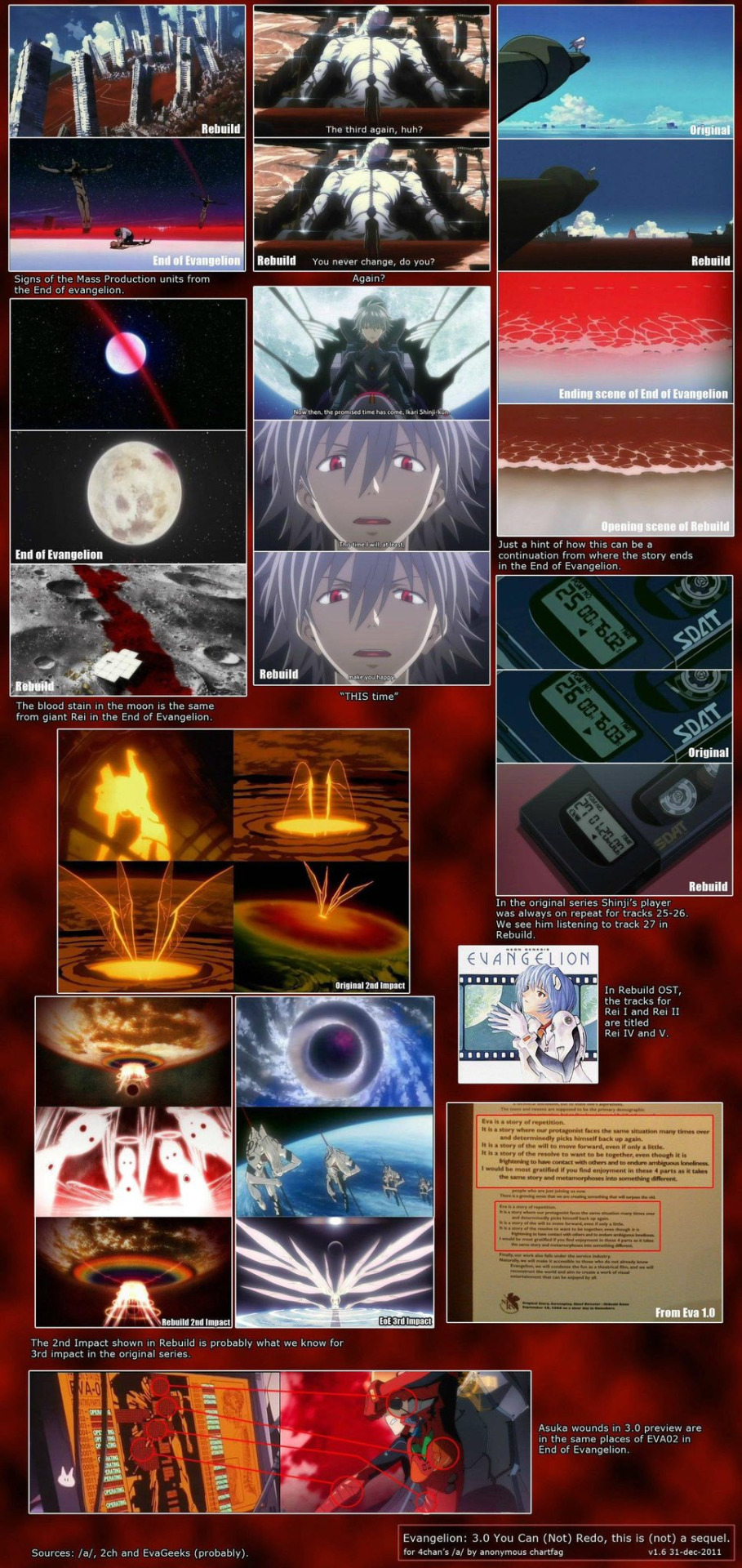
Non-exhaustive chart of potential connections between Rebuild and NGE/EOE, compiled by users on /a/ board in 2011. Full sized image here.
There are several environmental aspects of Rebuild's world that seemed to suggest a connection to The End of Evangelion, most obvious amongst these being the red sea.
As Kaji explains in 2.0, the seas were blue prior to Second Impact. Flashbacks to this event reveal that it bore slightly more in common with EOE's Third Impact than NGE's Second; note the presence of the Black Moon in the comparison above.
Early on in 1.0, there's a shot that shows cross-shaped white outlines in the red sea, that appear to be remnants of EOE's crucified mass production units.
The moon in Rebuild also has a large, red streak on its surface, that could be the bloodstain that was left there by Lilith in EOE.
Additionally, Shinji's SDAT in NGE always looped the same two songs, shown under the track numbers 25 and 26. In Rebuild, Shinji's SDAT's track number begins at 27, and goes up from there (it seems to represent the relationships he forms with other people).
Some iterations of loop theory suggested that Rebuild was set directly after End of Eva, and that the events of Second Impact as remembered by the cast were actually EOE's Third Impact.
Additionally, though its relevance to any canonical NGE content is tenuous (tenuous, but not irrelevant when it comes to Rebuild; see the bonus chapter), Sadamoto's NGE manga also ends with a kind of timeloop.
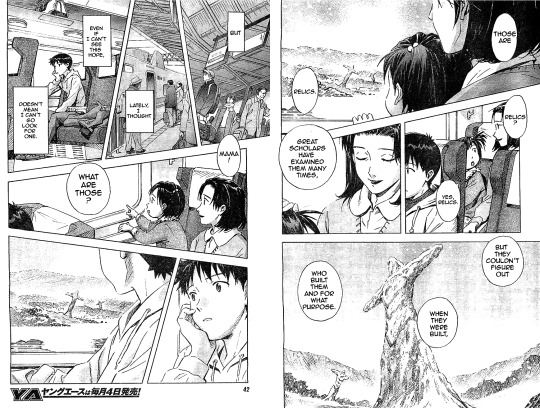
From the epilogue chapter of Yoshiyuki Sadamoto's Neon Genesis Evangelion manga. Full sized image here.
After Instrumentality, the epilogue flashes forward to a long time in the future, where the crucified Evas are seen as some kind of relic from an unknown time.
We see Shinji, Asuka and Kensuke reincarnated, and Shinji and Asuka meet for the first time, with some sense that they've seen each other before.
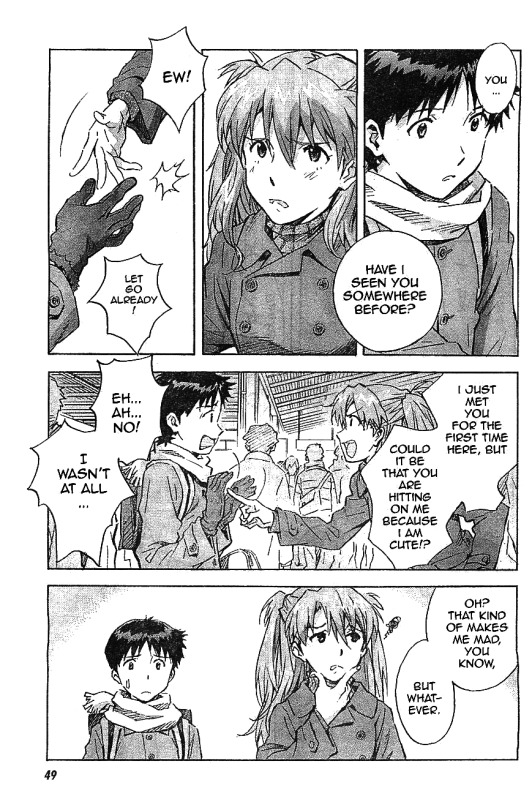
Full sized image here.
This ending could be seen as an explanation of sorts of what's going on in Rebuild; the characters have been reincarnated a long time after the fact, while elements of the old world remain as part of the environment.
ESTABLISHING OUR BASES, PART 3: DOUBT
It should go without saying that, even at the time, these particular conclusions had holes in them. (This is to say nothing of the hundreds of other iterations of loop theory; if we went through every whacky headcanon explanation people posted on Reddit under the guise of it being any kind of genuine theorization, we'd be here all day)
Sequel Theory, especially past 3.0, required you to ignore contradictory information being presented in the same scenes the evidence being drawn on was. The comparison image I included earlier (it pre-dates 3.0's release, but was certainly spread around long after the fact) suggests that the Four Adams as they appear in 2.0's flashback could have been the Mass Production Evas (of which there are 8, not 4!). Two of the lines from Kaworu it included also don't support this line of reasoning; both "This time..." and "You don't change" imply multiple previous loops, not a singular. And while we haven't mentioned them so far, the coffin he emerges from in 1.0 being one of several was also something people were aware of back then.
Speaking of Kaworu - Shinji's Happiness Theory doesn't seem to line up with the way he goes out in NGE, either. He asks Shinji to kill him with the goal of achieving true freedom; it doesn't seem like he's looking for a next time, but rather an ending, away from his destiny as an angel. It doesn't really follow that Rebuild's loops would be a journey he'd set himself on willingly, rather a circumstance he's put into by some other force.
SECTION 2: PAYOFF
3.0+1.0 responds to the foreshadowing of previous entries in a way that's kind of inconclusive, on its face. I'm going to save the potential answers for the next section; for now, let's just go over the information we did get, including some things you may have missed.
PAYOFF, PART 1: OUT IN THE OPEN
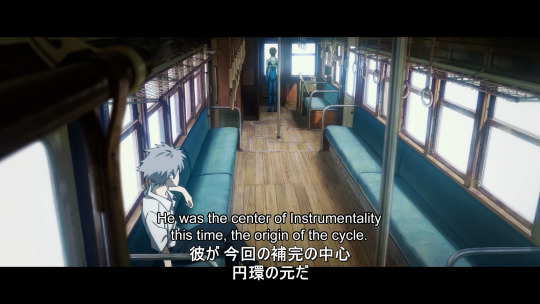
Kaworu describes Gendo as being the origin of the cycle. Full sized image here.
Our first piece of confirmation, and first in-universe mention of the loops (or "cycle"/"circle"), is this line. "Gendo was the center of Instrumentality this time", the "this time" implying there have been other Instrumentalities with other person/s at the center. "Origin of the cycle" may indicate that Gendo is in control of the loops as a whole, or it may instead indicate that different people start them, perhaps through Instrumentality.

Asuka wakes up on the beach. Full sized image here.
After coming to terms with her feelings, Asuka "wakes up" in the same spot she was lying at the end of EOE, wondering if she was asleep. This is still in the anti-universe, but as was established by Gendo earlier on in the film, the Evangelion Imaginary and the anti-universe as a whole manifest as parts of one's memory. Asuka is our POV character for this section with her, so she must recall having been here. Maybe you could interpret "was I asleep?" as Soryu, specifically, having woken up.

Selections from Kaworu's Instrumentality. Full sized image here.
Anything that focused on Kaworu here was always going to be the juiciest in relation to the loops, but it's surprisingly upfront even then: There have been multiple previous loops, and Kaworu is not in control of them, he just continues to exist without agency over them like all of the other key players do. (That's both of our aforementioned Theories disproven in one scene!)

Kaworu introduces the "Book of Life", Kaji clarifies the details. Full sized image here.
We're also introduced to a new concept here, the "Book of Life". There's very limited information on what this does, but at least Kaji is here to fill in some details Kaworu conveniently leaves out, as he likes to do (that, if nothing else, Shinji and him meeting over and over again is something Kaworu has power over.)
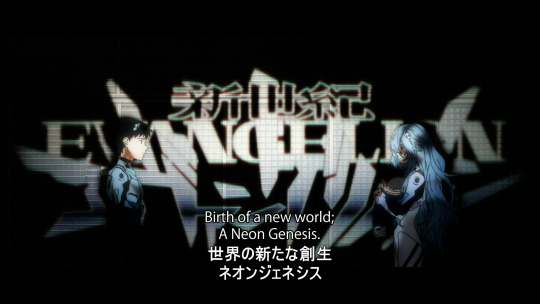
Rei and Shinji discuss the birth of a new world. Full sized image here.
Most of Rei's instrumentality scene exists to wrap up the other aspect of Rebuild's narrative we're not talking about here, so I'll skip past all of that to this: with Unit-01 and the Spear of Gaius, Shinji is capable of creating a new world, through a power known as Neon Genesis. It may be worth noting that Shinji has to clarify that he isn't going to rewind time or revert the world, just create a new one on top of the existing. This may establish a precedent for characters in control of Instrumentality being able to do both of those things.
PAYOFF, PART 2: A CLOSER LOOK
NGE has a LOT of references to the years its set in. Even beyond the on-screen text, there's plenty of instances of plaques and other signs with the 2015 date on them. Rebuild, however...

Yui's grave as it appears in 2.0. Full sized image here.
The only time we ever see a date in the first three films is here, on Yui's gravestone in 2.0. It's partially obscured by flowers, and may appear at first to read the same as her NGE grave did. On closer inspection, though, you can clearly see there's a 0 in front of 2004.
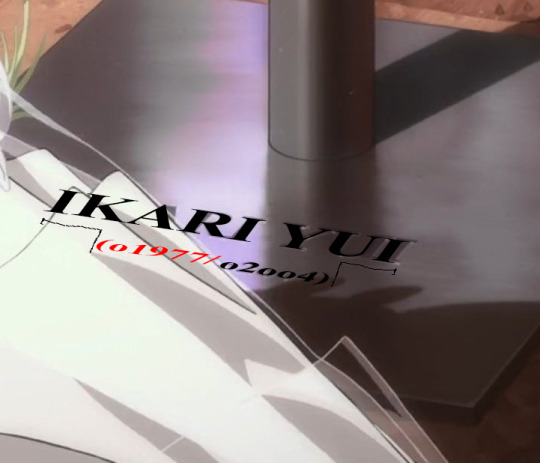
This could be what the gravestone has written on it. Full sized image here.
One time could mean anything, but it becomes a pattern when we see more dates in 3.0+1.0...
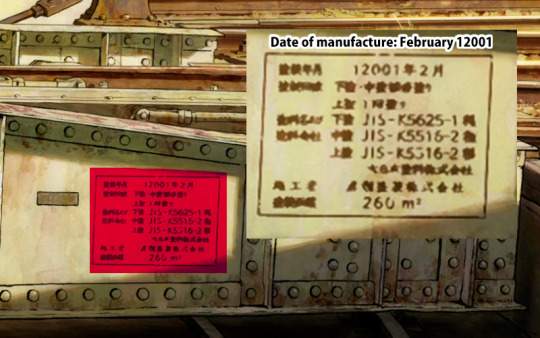
The manufacture information on the railway track turntable in Village-3. Full sized image here.

The plaque on the AAA Wunder. Full sized image here.
Looking at that date given on the railway turntable, the earliest date 3.0+1.0 could take place is the year 12001.
This, combined with the physical evidence present in the first two films, seems to imply that Rebuild follows the same rules established in the Sadamoto manga, that the loop isn't necessarily a reset of the world, but rather a continuous stream of time in which the characters are reincarnated. It makes sense Sadamoto would use this as the basis for his ending, too - he worked on the first two films, and the Mari bonus chapter clearly demonstrates that certain aspects of Rebuild were solidified during their production.
Furthermore, the scene in which Shinji asks Gendo what he wishes for has more visual references to EOE than you might think...

Gendo grasps his right arm, as if he remembers the time he lost it. Full sized image here.
The arm thing is obvious, and the line he says there could be about EOE, but you might notice something else in that image on the left there. There's a picture of Shinji in the background.
That image comes from one of the flashing sequences in EOE's Third Impact, in fact, the entire sequence is overlaid on top of that shot of Gendo.
This shot in 3.0+1.0 versus the same sequence in EOE. The encode of 3+1 I was using was dropping frames here, so I had to cut some of it out. Video mirror here.
By the way, adult Asuka's official name, as used in every piece of merchandising she's been in so far, is just "Asuka Langley", not "Asuka Langley Shikinami" or "Asuka Langley Soryu".
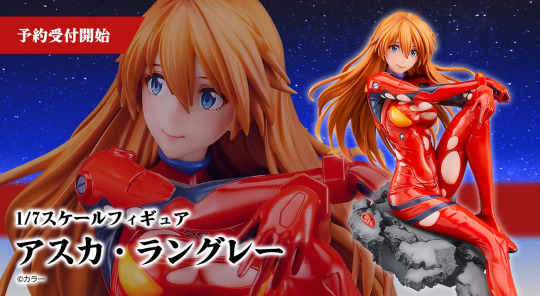
Good Smile Company's "1/7 Scale Figure: Asuka Langley". She has a fair few figures, all of them with this name. Other merchandise never calls regular Asuka this. Full sized image here.

Rei holds a doll of Tsubame. Full sized image here.
The same thing ends up happening with Rei in-universe. The version of her with long hair is clearly Rei from 2.0, who has been inside the entry plug this whole time, but when we see her on the stage, she's holding a baby doll. It has Tsubame (Hikari and Toji's daughter)'s name written on it.
It seems to follow that different versions of the same character end up re-joining into one during instrumentality, be that cross-loop like Soryu and Shikinami, or in-loop, like Rei and Sokkuri (Lookalike). This would appear to go beyond just regaining memories of previous loops, as Rei and Sokkuri existed in the same loop independently of one another.
SECTION 3: A PROPOSAL
And now, to get into the real meat of the issue.
...Whose doing was this, exactly?
Here's the thing: Kaworu, we can already rule out. We know it wasn't him.
The next most likely candidate you might think of is Gendo, but... is he, really? Because Gendo died in EOE (perhaps not physically, but regardless), killed by Yui, but ultimately of his own volition. He had come to terms with himself when he died. He doesn't seem like someone who would have still had unfinished business.
Then, what of Shinji? Well, I think it's the same deal with him, too. Shinji might not have found his place in life at the end of EOE, but he also doesn't seem like he was clamoring to start over, after all of that.
In their video, "What was loop theory? Investigating the truth after Evangelion 3.0+1.0", Japanese Eva fan, Eva Fan (lol), of Minna no Eva Fan fame, gives us a different answer:
It was Yui.

Yui entered the Eva experiment for Shinji's sake. Full sized image here.
Yui's motives in NGE may have been left mostly up to the audiences' interpretation, but I don't think there's any doubt she loved her son more than anything.
As Unit-01, she becomes God at the end of EOE, accepting the burden of being the eternal proof of mankind's existence.
She leaves Shinji behind, knowing that he still hasn't found his place in life.
A PROPOSAL, PART 1: YOU WERE WAITING FOR THIS MOMENT

Yui leaves Shinji as he comes into his own. Full sized image here.
The end point of the loops and emergence into the new world:
Shinji makes the decision to create a world that doesn't need the Eva.
Shinji and Yui, previously one being, separate.
Shinji breaks the curse of the Eva, becoming an adult, and now away from his mother, emerges into the real world.
As explained by Gendo, the anti-universe, the end point of Rebuild's story, is also the beginning, and somewhere Yui, at one point, resided.

The beginning and the end are one in the same. Full sized image here.
The anti-universe is "the one and only place fate may be bent to one's will". Shinji, in his parting words to Yui in EOE, tells her he thinks he'll keep making the same mistakes over and over.
To quote Hideaki Anno: Eva is a story that repeats.
In the aforementioned Eva Fan video, they suggest that the anti-universe may in fact be the world of NGE (perhaps, the world inside of Unit-01). Yui creates a new world through Neon Genesis, one which resembles the old, to tell the story of Shinji anew. To give him another chance to grow.
For as long as Eva is Shinji's story, it is Yui's; her goal was to bring Shinji a bright future, after all.
The act of piloting the Eva sees the child return to the place they resided before birth; back into the comfort of their mother's womb.
In Rebuild, the “mother” seems to become all but irrelevant - Yui Ayanami may reside inside Unit-01 but this is never touched on in the same way; Asuka’s mother doesn’t seem to even exist, and her original seems to reside inside Unit-13. The existence or non-existence of a mother’s soul inside of an Eva dictates nothing about who can synchronize with it (see: Unit-02, Unit-08, Unit-13, etc). However, taking a step back, it’s almost as if the reason why the presence of the “mother” is missing from the material world of Rebuild is because the entire series takes place within the world the mother created.
If Shinji entering the cockpit of an Eva unit in NGE is returning to the womb, then what is Shinji doing by existing in the world of Rebuild?
In deciding to create a world that doesn't need the Eva, Shinji is accepting life without his mother. The parting of mother and son represents the break in the loop.
He emerges into the new world, reborn as an adult.
INTERJECTION: WHAT’S IN A NAME?: YUI IKARI/YUI AYANAMI
Rebuild’s Yui’s name isn’t Yui Ikari (at least, her maiden name isn’t) - It’s Yui Ayanami.
In NGE, Gendo took her surname when they married. In Rebuild, Gendo already had the surname Ikari, and Yui Ayanami took his.
I think fans have been generally puzzled by the purpose of this change, but this interpretation - that Yui Ikari from NGE is the heart of the loop, the God that created the world and the God that Gendo would kill at the end of 3.0+1.0 - would seem to explain why this is the case. She’s Yui Ayanami because she’s a copy - like Rei is - of the original Yui. A Yui created by Yui Ikari.
This also may explain why the date on Yui's grave says "02004" - after all, it's the grave of Yui Ikari, not the grave of Yui Ayanami.
Rei of NGE is more than just a clone of Yui, she also holds a piece of Yui’s soul (in the form of emotional memory), while Yui herself resides in Unit-01. Therefore, it stands to reason that Yui Ayanami is not really an individual, but rather someone who holds a piece of Yui Ikari’s soul - I think even more so than Rei (who undeniably is an individual). Yui Ayanami may function as a kind of messenger for Yui Ikari, who holds the knowledge she has and steers the story in the direction it needs to go. There are many players in Rebuild who are more like symbols than characters, and I think this is a huge part of why Yui Ayanami is not a character like Yui Ikari was.
For the sake of brevity, I’m going to use “Yui Ikari” to refer to Original Yui, and “Yui Ayanami” to refer to Rebuild Yui, unless stated otherwise, for the remainder of this post.
A PROPOSAL, PART 2: ...WERE YOU THERE THE WHOLE TIME?
Kaworu himself wasn't brought into Instrumentality in EOE directly. Rather, the fetus of Adam was, through Rei intaking Gendo's hand. If souls like Rei and Sokkuri are capable of rejoining into one in Instrumentality, I wonder if the presence of Kaworu in Instrumentality can be explained by his soul rejoining with that of the Adam fetus. He definitely appears as Adam there, the same way Rei is Lilith.
Which brings us to this:

Shinji and Gendo upon seeing familiar souls: "Were you there the whole time?". Full sized image here.
Gendo offers Shinji the apology he never got to hear in EOE, and then realizes: Yui's soul was residing in Shinji.
Instrumentality likely reconciled the souls of Yui Ayanami (the individual who became Unit-01 in this timeline) and Yui Ikari (the soul who lived on as God, and in her son), the same way it may have reconciled Kaworu and Adam's.
For as long as Yui's soul resided in Unit-01, and in Shinji, her story was not over. For as long as Shinji was stuck in his loop of making the same mistakes over and over, Eva's story was not over. For as long as the Eva exists, Yui will, and End of Eva leaves Yui there, in space, as the eternal proof mankind existed at all.
If 3.0+1.0 says "goodbye to all of Evangelion", it must be the end of Yui Ikari's story, too.
INTERJECTION: WHAT’S IN A NAME?: “SHIN EVANGELION”
The Japanese title of Evangelion 3.0+1.0: Thrice Upon A Time is シン・エヴァンゲリオン劇場版𝄇, (Romaji: Shin Evangerion Gekijouban𝄇, English: Shin* Evangelion Theatrical Edition𝄇”).
There are three points of interest in this title:
Shin - The use of “Shin” here falls in line with the titles of Hideaki Anno’s other recent films: Shin Godzilla, Shin Ultraman, and the upcoming Shin Kamen Rider. While I’m not really the best person to explain this as I’m not really familiar with the source material, the other Shin films are based pretty heavily on earlier works in their respective franchises (I believe both Shin Godzilla and Shin Ultraman have sequences that are recreations of scenes from the original movie/series). Shin Eva also, obviously, does the same thing with NGE and EOE scenes.
*According to an interview with producer Akihiro Yamauchi on Shin Godzilla, the title of “Shin” was chosen for the film due to the variety of meanings it conveys. In all four titles, it is written ambiguously, and could be read as “new”, “true”, or “God”, amongst other things.
Evangelion - NGE’s title and Rebuild’s title are actually spelled differently. エヴァンゲリオン is the spelling of Evangelion used in NGE, ヱヴァンゲリヲン is the spelling used in Rebuild’s title (not the in-universe machines, for the record). They’re pronounced the same way, but Rebuild’s spelling uses characters that are a little archaic (if you want to get technical, it could be romanized as “Wevangeriwon”; note the use of “wo” instead of “o” just like in Kaworu’s name, and you probably get it.)
Shin Evangelion uses the NGE spelling, not the Rebuild spelling, which makes it sound like “Shin Neon Genesis Evangelion Movies”, not “Fourth Entry in the Rebuild Franchise” (in fact, “Evangelion Gekijouban” comes from Death and Rebirth/End of Eva’s Japanese names). Earlier posters for this film in English gave it the NGE font rather than a Rebuild style logo, which pretty accurately represents how this looks.
The symbol at the end - The symbol at the end of the title, is a symbol that’s used in sheet music. This could be read two ways - “Shin Evangelion Gekijouban: End”, or “Shin Evangelion Gekijouban Repeat”; If you assume 𝄇 is one symbol, then it’s a “repeat” sign (tells the player to repeat a section of the sheet music). If you assume it’s a colon and then a subtitle, then it’s an “end” sign (𝄂, signifies the end of the piece.)
A PROPOSAL, FINAL PART: TO KILL GOD
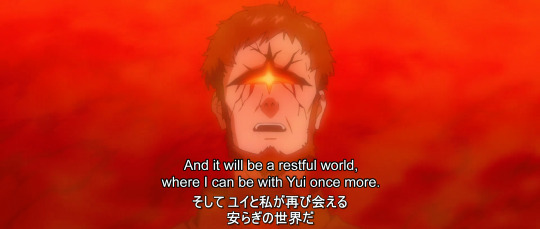
Full sized image here.
Gendo's goal in NGE and Rebuild is the same: To be reunited with Yui.
In Rebuild, he will become God through the use of the Key of Nebuchadnezzar and trigger the Additional Impact with himself at the center, so he can see her again in Instrumentality.
But there's a second aspect to this plan... Killing God.

Gendo lays out his intentions. Full sized image here.
I think it would be naïve of me to suggest that Gendo had any intention of ending things when he said this. These lines obviously pertain to something else (I think all of this is covered in the process of beginning the Additional Impact anyway), and it's made clear that he goes into Instrumentality as stubbornly as he always is.
He fully intended to destroy all of the spears, so nobody would have any way of manipulating or ending Instrumentality, so he could live peacefully with Yui for the rest of time.
Whatever it might have meant there... "Killing God" takes on a completely different meaning by the end of the film.
Yui Ikari is an existence that will live on indefinitely; someone who will never die, even long after humanity is gone. In becoming Unit-01, she alone will wait in the universe forever.
She once resided in the anti-universe; the Promised Land, the one and only place fate may be bent to one's will; she created the world of Rebuild of Evangelion, the beginning of everything.
Yui did all of this to give her son a better life. To let him try over and over again until he broke the curse of the Eva, and emerged into a brighter future.
She, Unit-01, Evangelion as a whole, could not rest until Shinji grew into his own.
Gendo comes to the conclusion during Instrumentality, after bleeding his heart out to his son, that he isn't any closer to reuniting with her.
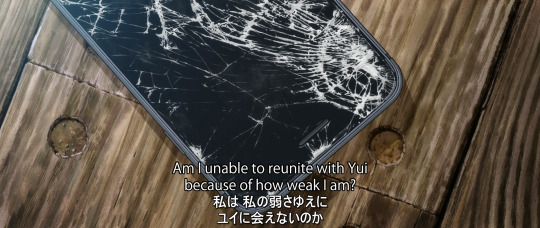
Full sized image here.
But after acknowledging Shinji's adulthood, accepting his own fragility, and resolving their story...

Full sized image here.

Full sized image here.
...He realizes she was right in front of him this whole time.
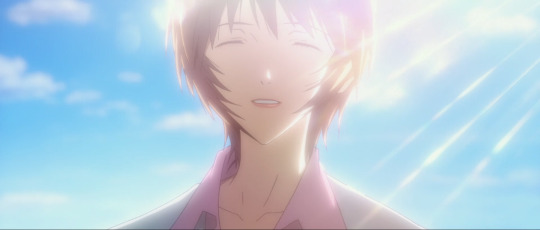
Full sized image here.
With this, Gendo exits the train - the same train his story began, the train station he abandoned Shinji at all of those years ago - his story is over. He no longer seeks eternal life with Yui.
As Shinji breaks his own curse of Eva and is reborn out of the comfort of his mother's world, and into a world of his own creation, he says goodbye to all Evangelion.

Full sized image here.
Gendo, in peace at the end of his own long journey, is willing to let Yui sleep.
And so, he kills God.
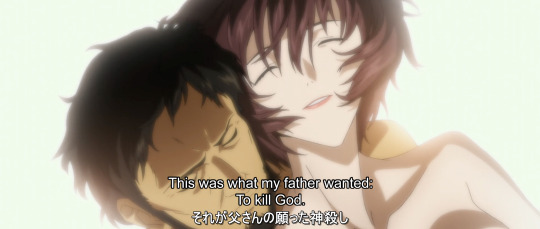
Full sized image here.
#evangelion#rebuild of evangelion#neon genesis evangelion#analysis#yui ikari#gendo ikari#shinji ikari#kaworu nagisa#yui ayanami#evangelion 3.0+1.0#shin evangelion#shin eva#nge#eva#loop theory
459 notes
·
View notes
Text
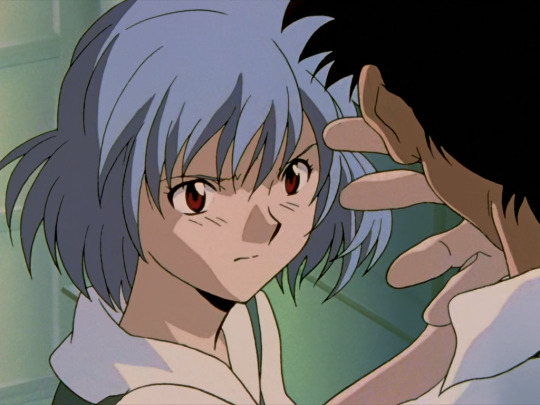
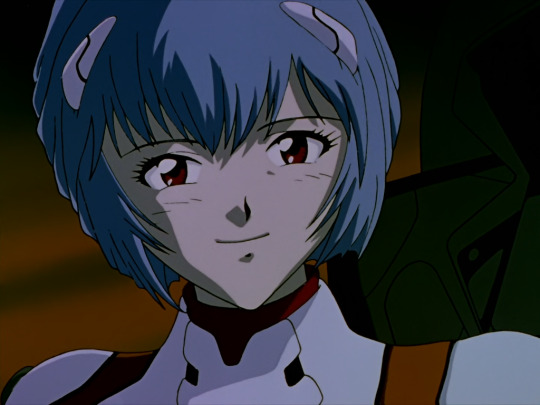
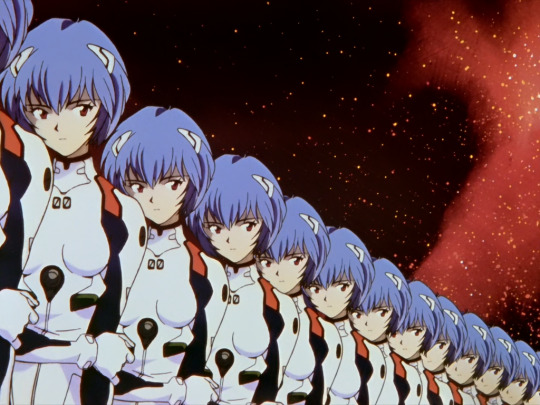
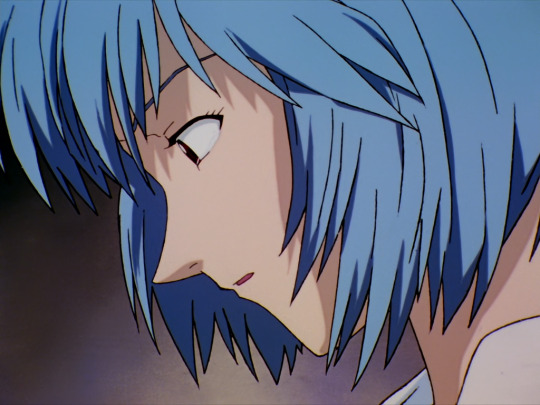
It began when the director told me, "It's not that she doesn't have emotion, but that she doesn't know what it is." His technical request was that I should read my lines as flat as possible. But she's obviously not a machine; she's a human being, flesh and blood. It's a huge difference between "not having emotion" and "not knowing emotion." After all, she could develop feelings, once she learned...
What I learned from meeting a girl who didn't know, Megumi Hayashibara
494 notes
·
View notes
Text
I know how we’re familiar with the kit and kaboodle of Kaworu misconceptions, but there’s another one that flies around every so often we should address too. Kaworu’s attraction by critics under a certain lens is sometimes argued as him being attracted to ‘broken people’ which in and of itself holds other troubling implications. It vilifies the neurodivergent. It damns the people with deep mental scars and emotional baggage, because we often hold the fear that there’s no way we can be loved. Should be loved. That we’re too high maintenance. That our trauma doesn’t exist on anyone’s timetable and that we aren’t people but walking burdens.
Evangelion’s audience is suffused with people during critical periods. People processing grief. People still in abusive environments. What idea are you trying to convey when you argue that if you’re deeply traumatized that people who love you aren’t truly able to? That in a world where abuse does happen and people often get away with proverbial murder, that no one exists for you out there? Even though this is the very same material that tells you that anywhere can be paradise? That even the little things can change someone’s world completely? That empathy is integral? That love is a powerful thing held by anyone?
Did we not watch the same show?
#neon genesis evangelion#kawoshin#kaworu#shinji#nge#correct me if i'm wrong#so i watched that new kaworu analysis a bit and i'm peeved#i didn't think i would be bc a lot of anti kaworu sentiment repeats so i'm burnt out from that#but the implications from this...i'm annoyed irritated maybe livid#abuse mention
220 notes
·
View notes
Text
Why I Believe John Lennon is Asuka Langley


Hello everyone! I originally created a thread about this over on Twitter, though I also want to post it here just because. I want to preface this by saying while this is mostly a joke, I still want to point out the similarities between the two. I find that both John and Asuka are very complex people/characters that happen to heavily relate to each other. Obvious spoilers for Neon Genesis Evangelion. TW FOR TOPICS SUCH AS SUICIDE AND DEATH.
CHILDHOOD TRAUMA
Both John and Asuka lost their mothers from a young age, with Asuka losing her mother at 4 and John losing his mother just before his 18th birthday. It’s known that John’s mother wasn’t exactly mentally stable as Mimi, John’s aunt, was given custody of him. Similarly to John’s mother, Asuka’s mom, Kyoko, was also mentally unstable. Kyoko lost her mind after surviving a failed experiment with Evangelion Unit-02. This experiment would also end up taking the life of Yui Ikari, Shinji’s mother (this is important info for later.) Kyoko ultimately committed suicide after losing her mind and her husband in the process. Though it is ambiguous how Asuka’s father felt towards her, he did indeed drive his daughter away by cheating on Kyoko while hospitalized. It’s also known that John’s father wasn’t very involved with him up until the height of Beatlemania. Both John and Asuka were never very close with their parents due to many different factors.
(It can also be argued that John and Asuka were both adopted, but Asuka being adopted was only canon in the manga. For the sake of this post, I’ll only mention canon events from the anime going forward.)
I would also like to bring up this video.
RELATIONSHIPS WITH LOVERS
John and Yoko will probably be the most recognized celebrity couple in the world. It’s also recognized that John had an Oedipus complex which was sometimes discussed. The same can be said for Asuka, considering the fact that she romantically latched onto Kaji, a 30 year old special inspector for NERV. Asuka does this to fill the void of a perfect father figure in her life, as well as filling the role of a lover. John mentions doing this with Yoko numerous times. John and Yoko would even go as far as calling each other mommy and daddy. Moving onto other romantic relationships, I will now discuss Shinji, Asuka, John, and Paul. Shinji and Asuka have this strange dynamic throughout the story of Evangelion. Asuka is secretly in love with Shinji (you can already see which direction this is headed in), though Shinji has a hard time reciprocating his feelings due to his own personal struggles. Asuka’s rudeness and constant bullying also confuses Shinji, leaving him to wonder what Asuka truly feels for him. In this scenario, Paul would be in the same boat as Shinji. Shinji and Paul both lost their mothers at a young age. Paul and John bonded over the loss of their mothers. In a way, this also happens with Shinji and Asuka. It’s easy to tell that Shinji is more drawn towards Asuka after she tells him that her stepmom isn’t her actual mother. John and Paul go on to have a rivalry as they grow older, which also happens to Asuka and Shinji, though their rivalry was highlighted since day one. This rivalry between the two characters progresses all the way to the finale of the series. You can say that Asuka finally accepts Shinji when she lifts her hand up to his cheek while he is brutally strangling her. This act is seen as her accepting him into her heart after everything that they’ve been through. John and Paul also reconcile towards the end of John’s life. In Evangelion, the world is quite literally destroyed at the end of the series when the two finally reconcile. I’m not gonna be cheesy and say the same for John and Paul, but yeah. MOVING ON NOW.
OTHER FACTORS
John and Asuka have a habit of trying to appear more “mature” than they truly are. Asuka constantly boasts about being the best and most mature out of everyone. Same can be said for John. We also see this with his marriage to Cynthia Powell, John’s first wife. In my eyes, John’s first marriage was a rush to maturity considering the fact that he was only 21. I could say the same for John having a child with Cynthia at such a young age as well. John and Asuka, though trying to seem mature, are ultimately vulnerable people who tend to regress. Asuka acts like a young, lovestruck girl with Kaji. John acted in a similar fashion with Yoko. Asuka and John had massive egos. What else is there to say, really?
FINAL SUMMARY AND A FUN FACT
This is gonna be a quick one that basically ties together the points of my threads.
John and Asuka were seriously neglected as children which had a massive impact on their social development, as well as behavior.
Both had large egos, yet low self esteem.
The only fun fact about the two I have is that they both know German and Japanese.
THANKS FOR READING!
#the beatles#john lennon#neon genesis evangelion#nge#asuka langley soryu#asuka langley shikinami#asuka langely#paul mccartney#beatles#character analysis#idk why i made this#at first i thought it was silly but then i was like damn they rlly are similar#mclennon#i guess it’s kind of mclennon-y#neon genesis asuka#neon genesis shinji#shinji ikari#asushin#dont take this too seriously#all for funsies
48 notes
·
View notes
Note
Considering how Dave/Jade/Karkat and Jake/Jane/Gamzee were treated in the epilogues, I get the feeling the writers don’t have the fondest opinions of poly relationships
Considering how a lot of things were treated in the Epilogues, I get the feeling the writers don’t have the fondest opinions of much of anything Homestuck related, lol. No shade to those who like them, they just have a very pessimistic feel to me.
… Actually, I just thought of something. Allow me to tangent for a moment.
The difference between Homestuck and The Homestuck Epilogues actually reminds me a lot of the dichotomy between the original ending of Neon Genesis Evangelion vs. The End of Evangelion. The original Neon Genesis Evangelion ending was very avant-garde, psychological, and had a deeply, oddly hopeful feeling to it. Everyone hated it, because they wanted an epic robot action sequence- an awesome, climactic victory to cap off a story that never existed. The hatred of the excruciatingly fitting abstraction of the ending of Neon Genesis Evangelion was so strong, people vandalized the GAINAX Studio building about it, and the people working on it were sent a lot of hate mail and even death threats. You know, crimes! Vandalism, death threats, and harassment are crimes!
As a response to this, GAINAX created The End of Evangelion, a film that is simultaneously a retcon and expansion of the original ending. It gives people exactly what they want- action, action, and more action. It also completely strips it of that off kilter feeling of hope you get. There is not a shred of hope left in you once you finish that film. It is scathingly, crushingly pessimistic. There are several sequences that are just outright hard to watch. But it’s exactly what people asked for, isn’t it? Epic robot action sequences, gunfire, explosions, death, death, death?
People had been asking for Homestuck to get “properly finished” ever since the final page came out. People wanted more focus on characters, relationships, and domestic drama. People have wanted the 12 layers removed from reality fanfiction version of the Homestuck ending that they created in their minds to be official and canon for years now.
They got what they asked for, didn’t they?
They asked for a small scale, character driven, relationship drama fueled fanfiction version of the ending, didn’t they? Do you think some people regretted asking and demanding this for years rather than making something for themselves the moment they heard the monkey’s paw curl?
Because I think the hundreds of people who totally jumped ship and even deleted their blogs did.
#homestuck#the homestuck epilogues#homestuck meta#homestuck analysis#neon genesis evangelion#nekro.sms
73 notes
·
View notes
Text
Biology in Evangelion: Angel blood is blue, so why is Tabris’ red? - A theory
To start this off:
This is about the original series + EoE, so any Lore or Explanations added or changed by the rebuilds is not acknowledged.
This heavily relies on my interpretation, which does slightly alter the meanings of certain terms
My knowledge on biology ends at 8th grade so I’m sorry if any of this is painfully wrong / explained very poorly.
I have never had any training when it comes to writing in english so this is all over the place and has many grammar errors
Introduction
The other day I thinking about the difference between lilim / human and the seed of Adam. Specifically their blood. Beings of Adam (angels) have blue blood and beings of Lilith (humans/Lilim) have red blood.
Sooo… why does Kaworu / Tabris have red blood? We know he has red blood because of his eyes (red eyes are when there is no pigment and the light reflects the blood cells), and after unit 1 squishes him and is being cleaned off we see her hand is covered in RED blood. (Like I said earlier this is just about the original series & EoE, but I find it important to note that there is no ignoring the fact that his blood is VERY red in the rebuilds as well)
Tabris is of Adam, shouldn’t his blood be blue? If his blood is red, does that mean he’s less of an Angel? Is he really an Angel at all? I thought about these questions for far too long, and actually got quite frustrated at some points due to what seemed to be inconsistencies, until I realised it all makes sense.
Tabris does not have the biology of an angel, but that doesnt change the fact that he is one. Why is that?
What is an Angel?
Before I get too into it, I want to define what an Angel is in Evangelion. What an angel is, is defined by the characters in the show without knowing the big picture. The definition being the 15 children of Adam are Angels.
In my interpretation an Angel is any and every being directly related to Adam. So Lilith isn’t an angel, and its offspring and clones aren’t either. They are Humans / Lilim. As an example following this logic, Evangelion Unit 1 (clone of Lilith) and all Lilim (offspring of Lilith) are not angels, and Adams children (Sachiel, Ramiel, Sandalphon etc) as well as Unit 0 and Unit 2 (clones of Adam) are.
I am very aware that Lilith is referred to as an Angel (specifically as the second Angel), but that is only because, like I said earlier, the characters that defined what an angel is didn’t really have the big picture in mind, nor did they have much information to go off of. Lilith isn’t of Adam, so it doesn’t make sense for it to be called an Angel. The humans found it after finding Adam, so they just assumed they are the same.
About clones
We know clones inherit the biology of their source body, even if the clone itself isn’t a 1to1 copy. So for example Rei is a clone of a Lilim (Yui), so her blood is red. As seen in her eyes and the bandages covering her many many injuries throughout the series are stained red. There’s no denying it, reis blood is red. This makes sense.
And this isn’t just for Humans / Lilim, it also applies to beings of Adam. We see this with unit 2 (a clone of Adam) in her fight with Zeruel and in EoE when she fights the mass produced Evas that her blood is also the lovely shade of blue associated with angels. (Note: To my knowledge we never see unit 0s blood, but if anyone has some scenes from the original series where we do see her bleed, let me know).
The blue blood is not something unique to Unit 2. We never see Adam bleed, however we do see that his offspring (not clones, but still related) do in fact have blue blood. Unit 1s fight with Sachiel in the second episode shows and confirms this best. This is why angels are “Pattern Blue”. It’s for their blue blood type.
Clone "genetics"
(We get a bit more into my personal interpretations here, but bear with me.)
Everything related to Lilith has red blood and everything related to Adam has blue blood.
…Right? Well, not always.
An example of this not always being completely being true is the same example I used earlier. Unit 2. Unit 2 is also related to Lilith.
Yes, she is a clone of Adam, but her soul is from Asuka’s mom, a Lilim. Unit 2 in my opinion is better described as being related to Lilith because of her soul. Who you are is determined by your soul and not necessarily your body.
So, she is related to Lilith and Adam simultaneously. But is better described as of Lilith despite being biologically of Adam.
So Clones biology is determined by the source BODY and not the biology of the original souls host, despite the souls source being better used to describe who / what the person or being is.
Where am I going with this?
Personally I believe that Kaworu is also clone of a Lilim. Which is why he can pass as human, and looks so similar to Rei. Both having red eyes, pale skin, light hair, a thinner body, and looking rather sickly.
Now, I do not know if this is canon or not, but if it isn’t ever outright stated it’s pretty heavily implied in my opinion.
Tabris says that Rei is “like him”. And he isn’t referring to the fact he’s an Angel, because Rei isn’t an angel. She has Liliths soul. Lilith isn’t an angel. But she also isn’t really Lilith. Yes, she is the Vessel for its soul but they are still referred to as different beings. Just like how Kaworu is the vessel for Adams soul, but Tabris and Adam are seen as seperate beings, seperate Angels even.
So, he must be referring to the fact that they are both clones of Lilim housing the souls of other beings, Lilith and Adam respectively.
Who Tabris is a clone of is a mystery. I personally like the theory that it’s Dr. Katsuragi (Misatos dad) but in the end it’s irrelevant. What’s relevant is that he is a clone of a Lilim. And like i determined earlier, clones inherit their biology from the source of the body, and not the biology of what originally housed their soul.
In conclusion:
Despite his soul being (of) Adam and being an angel, due to the fact that he is a clone of a Lilim, Tabris’ blood is red, and not Blue.
#let me know your thoughts!!#i have been writing this for weeks#she/her for the Evas because fuck you its my analysis and i do what i want#“Who you are is determined by your soul and not necessarily your body. ” or maybe im just trans lmao#evangelion#neon genesis evangelion#kaworu nagisa#rei ayanami#media analysis#nge
50 notes
·
View notes
Text
Shitty Parent vs. REALLY Shitty Parent

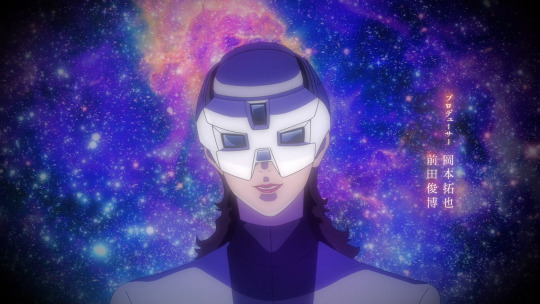
So I think this latest episode has finally given us a pretty good idea as to how Prospera Mercury and Delling Rembran act as dramatic foils to one another as the respective parents of our two main characters.


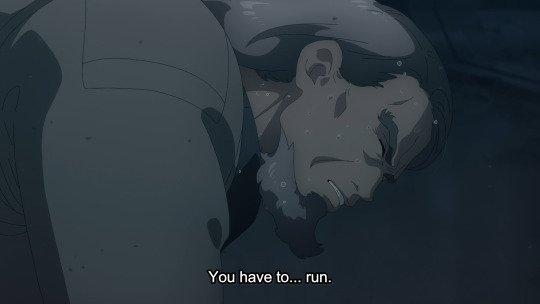
On the one hand, while it’s been hinted at ever since Episode 7, this episode confirms that Delling does genuinely care for his daughter underneath all that distant, aloof demeanor he’s always showing. We seem him in this episode take a proverbial bullet for Miorine at what was very nearly the cost of his own life, all while telling her to save herself.
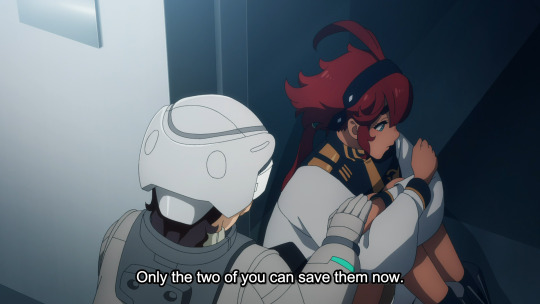

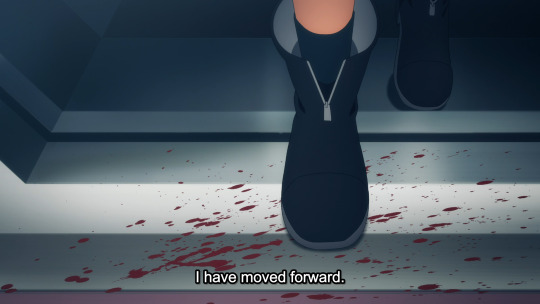
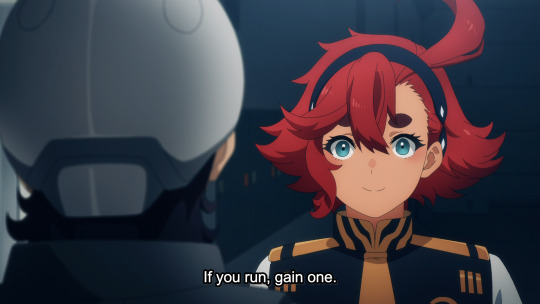
And on the flipside, this episode also seems to have given us a hint of the true scope of what seems to be Prospera’s manipulation of Suletta. How despite the open care and affection Prospera shows Suletta, it’s clear that she’s also been manipulating and grooming Suletta into becoming an outright killing machine who brutally cuts down her enemies without batting an eye. To the point where it even seems like Prospera may have even subjected Suletta to outright psychological conditioning and indoctrination, given how Suletta bounces back from a major traumatic breakdown once Prospera said a certain phrase to her.
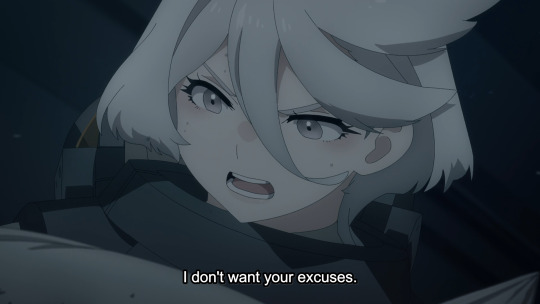

Now this isn’t to say something like ‘Psyche! Delling was actually a good parent all along and it’s PROSPERA who was the terrible parent!’. Delling is still absolutely a shitty father, plus it’s been pretty clear that Prospera wasn’t going to be a ‘good’ parent given how she’s acted shady as fuck basically from day one, particularly is you read the Star Cradle short story.
Rather, what I think we’re seeing here is that rather than the full-blown antagonistic, villainous ‘Big Bad’ parent he may have been initially set up as, Delling is more simply the ‘dysfunctional’ variety of shitty parent. IE; the kind who’s always loved and cared deep down for their child but has never been able to show it due to their own baggage/trauma/ego.


Essentially, Delling seems to have a lot in common with Gendo Ikari, complete with a tragic dead wife.
In contrast, in we’re continuing the Evangelion parallels, then Prospera could be likened to one of the darker interpretations of YUI, as the protagonists mother who acts loving and caring but is actually the true mastermind behind everything in the story. Not to mention if Eri really is in Aerial, it would basically be the Unit 01 situation just flipped on its head.
Or put another way if we look at a previous work of G-Witch’s writer: Delling is a subversive take on Charles Zi Britannia who turns out to not actually be the big bad, and Prospera is a take on Marianne who’s allowed to ACTUALLY BE the big bad.
Basically, both Delling Rembran and Prospera Mercury are shitty parents. The key difference is that Delling is the ultimately more benign ‘dysfunctional, stoic distant father who sucks at feelings but does genuinely want his daughter to be safe deep down’. Meanwhile Prospera represents the much more concerning case of ‘basically a cult leader who’s used her open care and affection to damn-near brainwash her daughter in being an actual killing machine’.
#gundam#gundam witch from mercury#g-witch#g-witch analysis#Suletta Mercury#Miorine Rembran#Prospera Mercury#delling rembran#evangelion comparisons#code geass comparisons#why delling rembran is a shitty parent#and why prospera is a WAY MORE shitty parent
268 notes
·
View notes
Text
ughhhhhhh just. god. asuka saying rei must look down on the other kids bc she’s the commanders favourite and gets special treatment and rei immediately saying that’s not the case is just. so much worse in hindsight. gendō's favouritism of rei is not built on anything good, it’s based off of using her as a substitute for his wife, and that’s obviously a very fucked up and traumatic way to treat a child, even if she’s not actively being sexually abused, and considering. well. a lot of things (i am still working on that analysis) unfortunately i think it’s more likely that the poor girl is :(
33 notes
·
View notes
Text
Evangelion: 3.0+1.0 Thrice Upon a Time Ending: Shinji's Happy Ending?

It's great to hear that the ending of "Evangelion: 3.0+1.0 Thrice Upon a Time" provides fans with a long-awaited sense of closure and happiness. The resolution, with Shinji creating a new world, free from the conflicts of Angels and EVAs, and finding stability and happiness with Mari, represents a significant departure from the darker and more complex themes of the series. Though it seems completely out of left field that Shinji would end up with Mari, it actually works out.
Shinji and Rei


Though Rei is good to Shinji and is affectionate toward him, this is mixed in with her being created from his mother's DNA and her lack of autonomy. The genetic connection between Rei and Yui brings an inherent familial bond. If romantic feelings were to develop between Shinji and Rei, it could be interpreted as having incestuous undertones, as Rei essentially shares genetic material with Shinji's mother.
Opting for a platonic or sibling-like relationship helps navigate the potential uncomfortable implications of the genetic connection, contributing to a more emotionally stable and healthier friendship between them in the context.
Shinji and Asuka



As Neon Genesis Evangelion is meant as a deconstruction of anime tropes, so is Asuka and Shinji's relationship a darker take on tsundere romance stories.
Asuka's blunt and abrasive demeanor serves as a defense mechanism, masking her own insecurities and traumas. This can make it challenging for Shinji or anyone else to easily discern her true feelings, creating a barrier to establishing a healthy relationship.
Asuka's pride serves as a defense mechanism, shielding her from potential emotional pain. By projecting confidence and superiority, she attempts to avoid vulnerability and rejection. This can be seen in her reluctance to open up to others and her tendency to mask her true feelings.
Shinji is totally unable to give Asuka affection on the terms she wants ("You won't even hold me!") and only goes to her to assuage his own pain. Likewise, Asuka is only ever able to give Shinji tough love (Shinji: "Doesn't everyone hate me?" Asuka: "You idiot, you've just gotten that in your head by yourself!").
Shinji and Kaworu

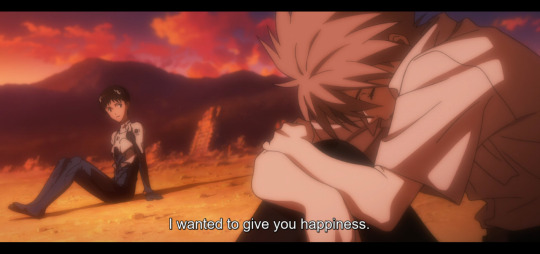
Kaworu, though wanting to make Shinji happy, does so at the cost of his own happiness. Their relationship becomes a focal point, as Kaworu becomes the first person to genuinely understand and accept Shinji without judgment. However, the complexity arises due to Kaworu's true nature as an Angel and his ultimate mission conflicting with Shinji's role as an EVA pilot.
Though it's admirable that he's willing to help Shinji through his problems and even teach him how to play a piano, his self-sacrificing nature and his Shinji-centric matyrdom would make any relationship beyond the platonic self-destructive in the long run. A romantic relationship with Shinji would be overshadowed by the knowledge of Kaworu's eventual sacrifice, introducing an inevitable and heartbreaking element.
Why Mari Would Be The Best Choice For Shinji's Future?
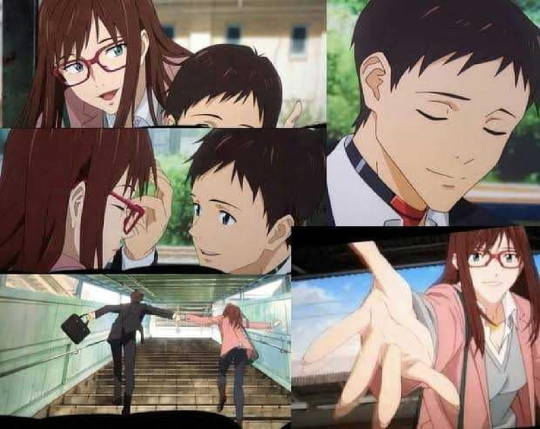
Rei's true nature means she and Shinji can't be together. Shinji and Asuka confess their feelings but decide they've hurt each other too much and grown too far apart for a relationship. Kaworu realizes he threw himself so far into trying to help Shinji, he forgot himself along the way. In contrast, Mari represents hope for a new life in a new world, as her relationship with Shinji will be unburdened by the past.
This choice in the narrative may reflect the film's theme of moving forward and finding happiness, as Mari is portrayed as a character with less emotional baggage from the series' past. Her energetic and eccentric personality contrasts with Shinji's introverted nature. Their dynamic could bring a positive and lively influence into Shinji's life, potentially helping him break free from his emotional struggles.
Ultimately, the choice of Mari as Shinji's future companion reflects the film's thematic emphasis on moving forward and finding happiness. While interpretations may vary, Hideaki Anno's decision to set Shinji with Mari offers a unique perspective on how characters can evolve and find solace in new relationships.
#anime and manga#hideaki anno#neon genesis evangelion#rebuild of evangelion#evangelion asuka#mari illustrious makinami#shinji ikari#shinji x asuka#shinji x kaworu#neon genesis asuka#neon genesis rei#neon genesis kaworu#anime theory#anime thoughts#relationship#anime couple#character analysis#analysis#film analysis#anime review
20 notes
·
View notes
Text
This is it this is the day I go crazy and talk about Akagi Ritsuko for way longer than anyone in 2024 should.
The way I have seen her miscaracterised is so.. so heartbreaking to me. Granted the Eva fandom is huge and I haven't been a part of it for a suuuper long time (I mean, the original fanbase from 30yrs ago is reduced to little more than a bunch of ghost accounts on dead forums by now) but the most common interpretation I see of her is something like this: A cold woman who has buried almost all her feelings for the sake of doing anything Gendo tells her because she's in love with him, who knows what she's doing is wrong, but who doesn't seem to care. A woman who has learned to care so little for the pilots, in particular Rei, who many people even say she hates, who only takes a stand on the "good side" once Gendo has personally scorned Ritsuko's love for him by having her put in solitary isolation.
And to me, that reading if her is just... Well not *wrong*, there aren't any *wrong* interpretations in media... What it is instead is willfully ignorant of so much if her character that proves almost all of that to be untrue.
Like yes, Ritsuko is cold. She's calculating and logical, but that's really about as far as the popular interpretation of her goes. She explains that being overly idealistic isn't something she scorns ("it's a nice way of thinking" directed at Maya and "your outlook is also important" directed at Misato) but something she knows she can't indulge in, otherwise the entirety of NERV's operating force would be hinged too much on personal feelings. Also, it's something she doesn't really know *how* to do. Look at Ritsuko's history -- a girl who practically grew up at NERV HQ, during the Second Impact, living under the constant shadow of a mother who didn't even give her the time of day. They write letters to each other in keigo instead of talking face to face. This is clearly a girl who's been isolated at least since high school, probably longer, who has probably lost so many people due to growing up during a damn extinction event. Someone who admits to being so poor at human connection that she supplements any hope for a family by raising cats, and even then! Even then she has to hand them off to relatives when her work gets too much for her. It's not that Ritsuko is cold and unfeeling because she enjoys it or scorns closeness, it's because she has never had the means or freedom to learn and foster those skills. It's her who introduces the concept of the Hedgehog Dilemma, she knows better than most how much you'll struggle to form bonds if you don't consistently try.
And Misato isn't some beacon of pilot safety either. The idea that she's the nice, sweet, helpful one and Ritsuko is the evil wench driving the pilots to their death is just blatantly incorrect. There are MULTIPLE instances of Misato being the one to endanger pilot safety, and Ritsuko being on the other end discouraging that. Take episode (I think 7 or 8?) where Ritsuko confronts Gendo about using children as pilots. She laments placing all of the burden on them, and spearheads the Dummy Plug system in the hopes it will alleviate that strain. Whereas Misato has made multiple allusions to molesting Shinji, has kissed him fully on the mouth, and seemed completely unaffected by the idea of sinking Asuka to unsafe depths in their fight against the 8th angel. The only difference in how they treat the pilots as child soldiers is that Misato is more vocal about how upset it makes her, whereas Ritsuko, not one to be talkative when it comes to her own feelings, as Misato points out, is not.
More examples of Ritsuko being nice to the pilots include: Teaching Rei and Asuka how to cook at Rei's request so that they can have a dinner together with Gendo and Shinji. Ritsuko sees this child, this child raised inside NERV in near total social isolation, begging for a chance at social contact, and she takes time out of her schedule so busy to the point she doesn't have time to wash her own clothes, to teach Rei how to cook. That brings me onto the next thing, actually, the way she's constantly characterised as despising Rei (specifically because she's "a competitor for Gendo's attention"). I can think of, at most, 2 canon instances where Ritsuko is actually mean to Rei in any specific, targeted, or substantial way. One is when she destroys the Dummy Plug system because, quote "these are just empty vessels, they have no soul. I'm going to destroy them, because I hate them." Which is bonkers to me! Bonkers! Because my IMMEDIATE thought when I first saw that scene was "Oh, of course Ritsuko hates the Dummy Plug system, it's science taken too far, it's a disgrace against life to create soulless husks, of course Ritsuko sees it as science used for too evil a purpose to justify. She hates them because they're inhumane." But somehow everyone took that as "Wow Rei I hate you so much I'm going to kill a bunch of your clones"?? I'm sorry, but since when has Ritsuko been characterised as being so *petty*? I mean, this is a 14 year old girl she's supposedly beefing with here.
The only other instance is when she says "(Unit 00) was definitely trying to kill me" after it goes AWOL during the 11th angel attack, implying Rei (who's soul is inside Unit 00) hates her, presumably because of something shes done. But OF COURSE she thinks that. Of course the head of this operation, who has overseen all of these horrible things, signed off on so many inhumane fights, thinks her soldiers want her dead. I don't think for one second Ritsuko thinks she's a good person. She literally says "you'll learn (that being idealistic is impractical) the first time you feel dirty." She feels guilt over what she does just like I said before, just like Misato does forging forward with this whole operation, she's just more quiet about it.
So why? Why does she do this? You can put Misato's involvement with NERV down to a genuine desire to help, the genuine illusion she's doing humanity good by protecting it. Throw in her half a revenge plot, and you can say she's doing these horrible things for ostensibly just reasons. But Ritsuko knows infinitely more about the inner workings of NERV, to the point it's implied (?) she killed Kaji, one of her only friends, to keep the information safe. People always put it down to just "she loved Gendo, that's why" and yes, frankly, that's a terrible reason. It also, doesn't make sense!
Take Ritsuko, a woman with little to no social fluency, a woman who can bouy herself only on her scientific merit, because remember, she lived in her mother's shadow for most of her life. The only way to ascertain her worth, especially underneath someone as unfeeling as Gendo, was to prove her commitment as a scientist. She didn't *have* anything else, she couldn't have anything else, no matter how much she wants to. A woman that has fought so hard for the approval of Gendo, and imagine you're her. Imagine your own mother won't even speak to you. You don't have any father around and you never mention him, but there is a man your mother seems to love. Odd, considering she doesn't seem to love you in any way that really counts. You'd want his approval too, no? You'd want approval from the man your mother, your overshadowing scientific monolith of a mother, melted back into humanity for. You'd want to prove you were as good as her, that you could enrapture the man she managed to ensnare. Because all you want is for people to see you, recognise you, that's like - THE key theme in evangelion across so many different characters. And remember Ritsuko was a highschooler when she met Gendo, when she found out her mother was having a fling. Imagine you're orphaned soon after, and all you have left is impossibly large boots to fill and this man, this man who is important, talented, and special enough to make your mother look at him, and he's asking you to help him. Of course you would. Of course you would. Because all you want is some human affection, no matter how clinical and predatory it manifests itself.
The line about Ritsuko and Gendo is literally "I wish you'd use my body again, like you did back then." Because Japanese lacks plurals, it can also be read "I wish you'd use my body again, like you did that other time." (In fact, I'm actually more inclined to that one because I see 時 used for singular occurance more than multiple ones, in which case 頃 feels a little more common?) I'm sorry, but you'll never convince me this wasn't grooming. Just look at the situation I described and try and convince me this is shorthand for "she was in love with Gendo." Idolised him, sure. Desperately craved his approval on an intimate and academic level? Yeah. Bit *loved* him? No. And there's certainly no way Gendo felt anything back other than some weird, predatory affection (I mean seriously, Gendo. You knew this woman when she was a high schooler and you were old enough to be banging her mom. There's a lot wrong with you already but now I'm adding perv to the list.)
And the plan he's making you execute, wouldn't you find it captivating too, if you were her? A world where all those emotional roadblocks you've built for yourself finally disappear, a world where you can open your heart and see your mother again, perhaps connect with her for the first time. A world where you don't have to prove your worth as a individual because you'll be part of so much more. A hivemind filled with love, clarity, and pure acceptance. Sure, she's not some virtuous saviour of humanity, but neither is Misato, really. No one who works at NERV can do so with a clear conscience or for an entirely noble cause. What I'm saying is that Ritsuko isn't as shallow as to do all that for Gendo's dick. She has complex, self-rationalised reasoning there like everyone else.
And that just brings me back around to her relationship with Rei. Maybe she does hate Rei, a little bit. Not because she's vying with her for Gendo's attention, because that's stupid. Ritsuko is a piller of calm rationale, of impersonality and reticence. In what world would she possibly be that possessive of anyone, even the man she idolises on a personal and academic level? She isn't even remotely cold or aggressive towards Kaji when he steals away Ritsuko's only friend or actively goes digging for NERV intel, she's KIND to him, welcomes him as much as she's able to with how closed off she's become. She isn't desperate for attention in the outward way someone like Asuka is. She wants Gendo to approve of her, but never exclusively. Id say the only person she's ever in competition with on that front is her own mother.
Rei is just like her. A girl with limited social contact who's only link to some greater sense of being and humanness is through Gendo, of all people. She needs him, depends on him, sticks to him and adores him despite knowing he's mistreating her ("I don't get special treatment. Believe me, I'd know.") She's also been groomed to be Gendo's obedient, grateful puppet, grateful because if not for him, she'd have somehow less. Maybe Ritsuko does resent her. Maybe it's like looking into a mirror at your old self and wishing you could slap sense into the person you used to be. Or maybe it's like looking at the person who made your mother commit suicide in guilt, perhaps. Everyone seems to forget that little detail.
Maybe the Dummy Plug system being destroyed wasn't Ritsuko's personal act of scientific disgust, maybe she hated those lifeless clones because she cares about Rei so much she knows a fate of reanimation into indentured military servitude is worse than death. Maybe a life spent captive under Gendo's grooming is worse than death fighting the angels. Maybe she can't stand the thought of Gendo using a person so many times over, never learning his lesson. Maybe she wanted to take away one of his strategic devices and punish him. But "she just hates Rei that much" seems like too shallow and excuse.
When Ritsuko turns on Gendo, everyone assumes it's because she's finally been personally scorned by him, and has realised he doesn't love her, or that she's angry he's thrown away all the scientific research she's poured into project E and wants to spite him. And okay, maybe those contain a grain of truth, but combined with her destruction of the Dummy Plug system and her asking him as early as episode 7 if using child soldiers is really something they can justify, Ritsuko's betrayal reads to me as a woman who has finally been given a wake up call surrounding the man who has used her for most of her life. Ritsuko is a woman who is closed off by necessity, of course it takes her personally being wronged by him in a massive, obvious way, to realise just how irredeemable he is. It's not "once you hurt me, that's it for you." its "once you hurt me, I can't overlook you hurting everyone else anymore because of how much I idolised you." That's a selfish road to take, sure, but Ritsuko hasn't the social fluency to be less so. Further proof her rebellion isn't just some scorned lover's hissyfit as so many people paint it is that she *continues* to actively work against him, dedicating all her time and skill, for 14 years during the Rebuild movies. She is so dedicated to stopping him that she works with WILLE for 14 damn years. If that's not a woman thoroughly convinced this man needs to be brought down for his crimes, I don't know what is.
Anyway. I have thoughts about Agaki Ritsuko. My beautiful blonde morally grey but still complex and emotionally wounded babe.
#nge#eva#neon genesis evangelion#rebuild of evangelion#ritsuko akagi#akagi ritsuko#ritsuko#misato#misato katsuragi#ikari gendo#gendo ikari#character analysis
17 notes
·
View notes
Text
Mari illustrious Makinami - Clone? Cloning and Rebuild Eva
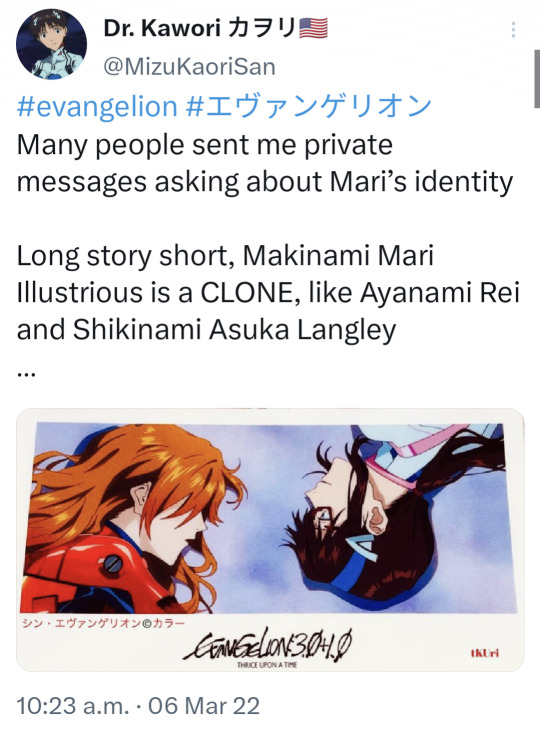



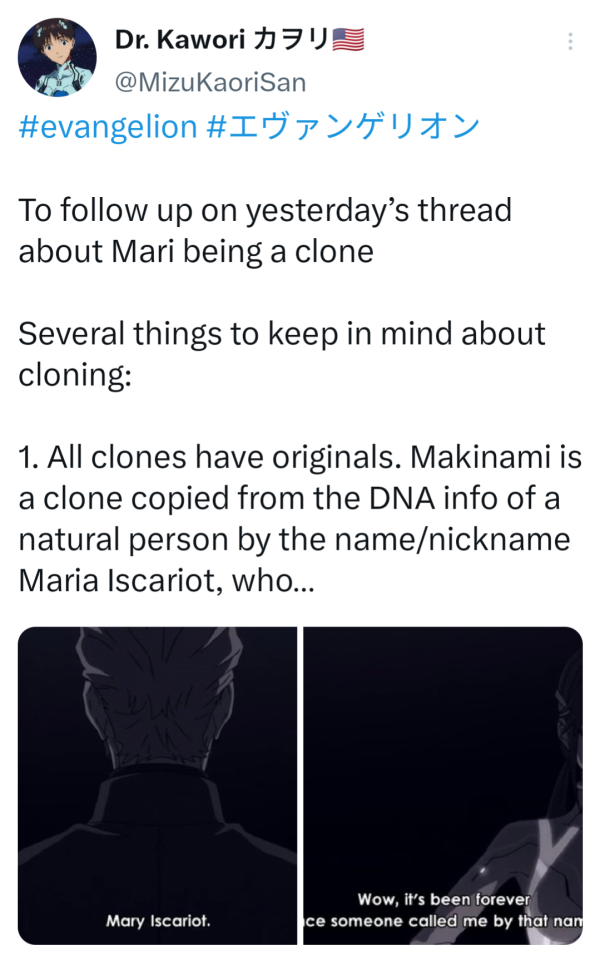
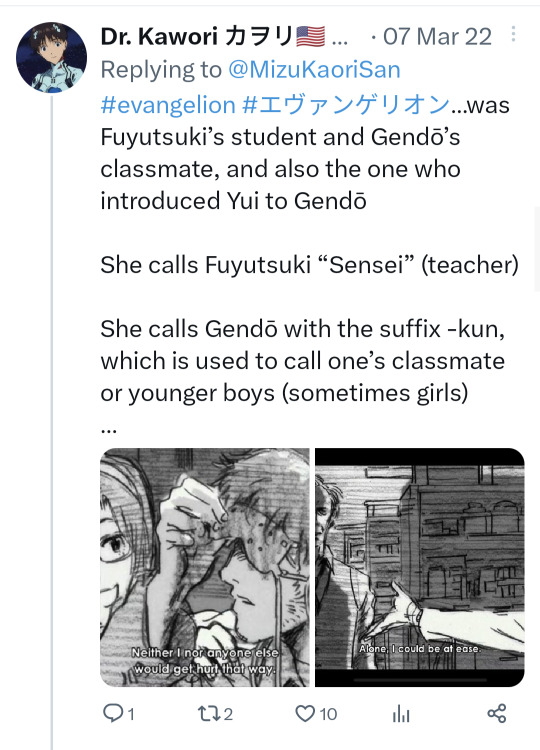




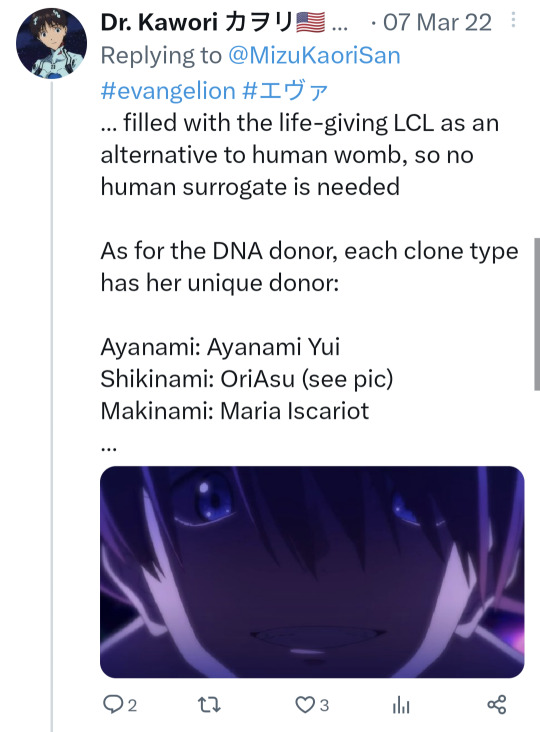

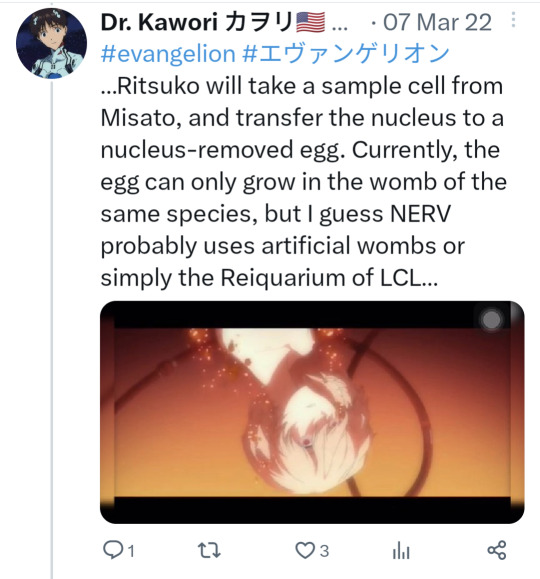

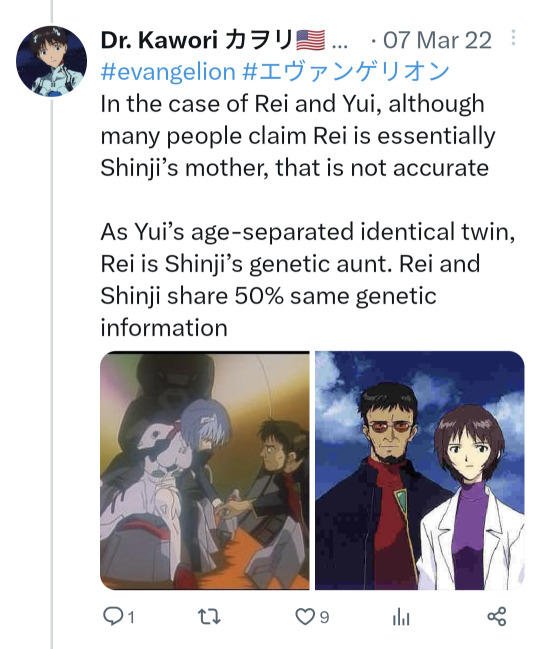

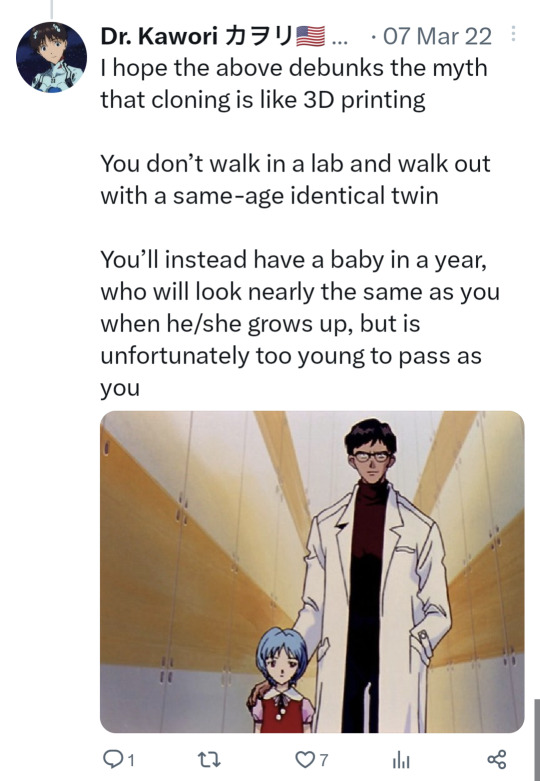
#mari illustrious makinami#rebuild of evangelion#theory and analysis#rei ayanami#asuka langley shikinami#yui ikari
90 notes
·
View notes